Entrepreneurship and Small Business Management in Hong Kong
VerifiedAdded on 2022/10/01
|22
|5019
|378
AI Summary
This report explores the world of businesses especially the SMEs for Hong Kong people. It covers factors such as political, cultural, and social influence business activities and the management styles of entrepreneurs have significantly influenced the employees. The report also discusses the importance of small businesses and start-ups in Hong Kong, and the different types of ventures that might be considered entrepreneurial.
Contribute Materials
Your contribution can guide someone’s learning journey. Share your
documents today.
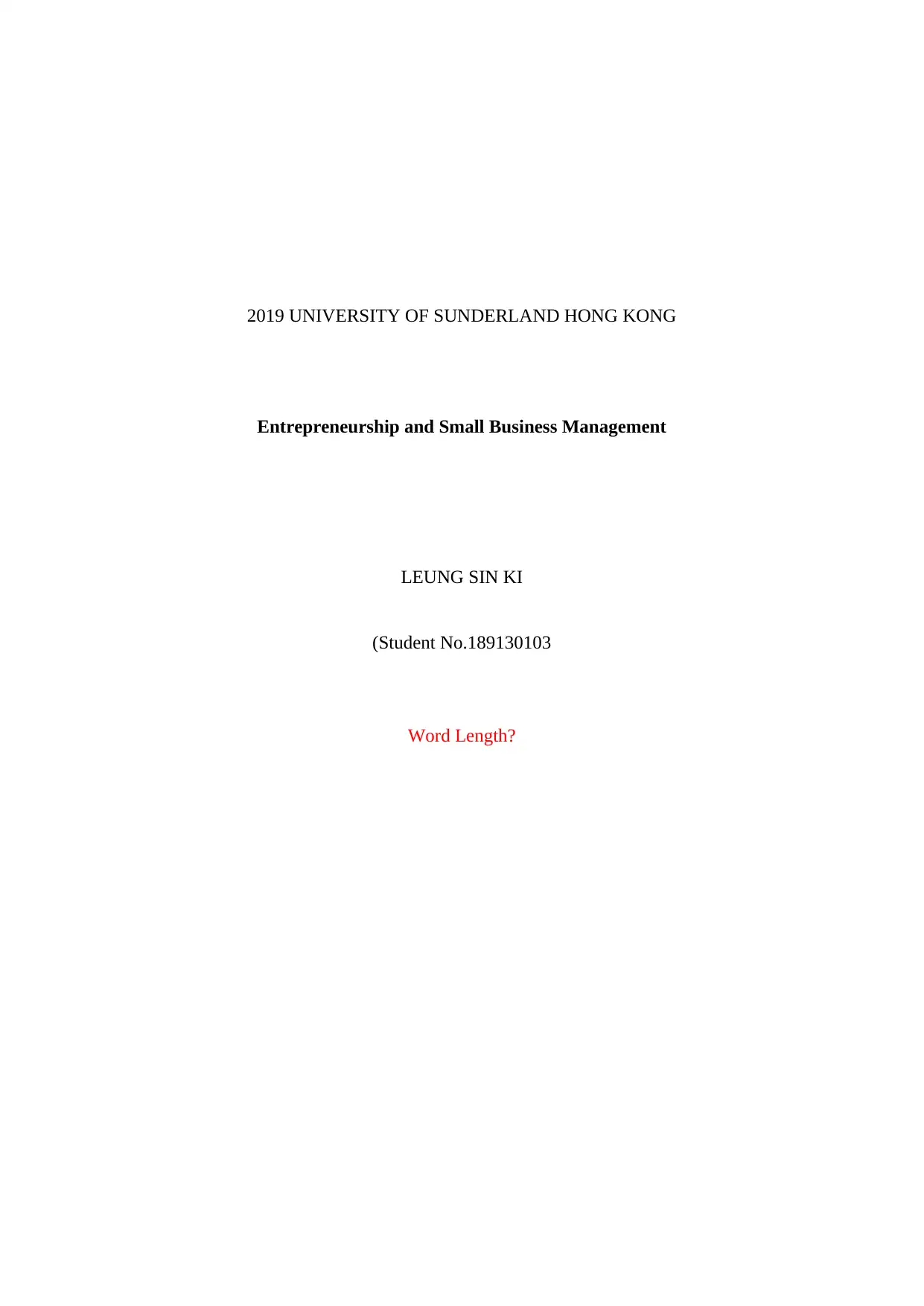
2019 UNIVERSITY OF SUNDERLAND HONG KONG
Entrepreneurship and Small Business Management
LEUNG SIN KI
(Student No.189130103
Word Length?
Entrepreneurship and Small Business Management
LEUNG SIN KI
(Student No.189130103
Word Length?
Secure Best Marks with AI Grader
Need help grading? Try our AI Grader for instant feedback on your assignments.
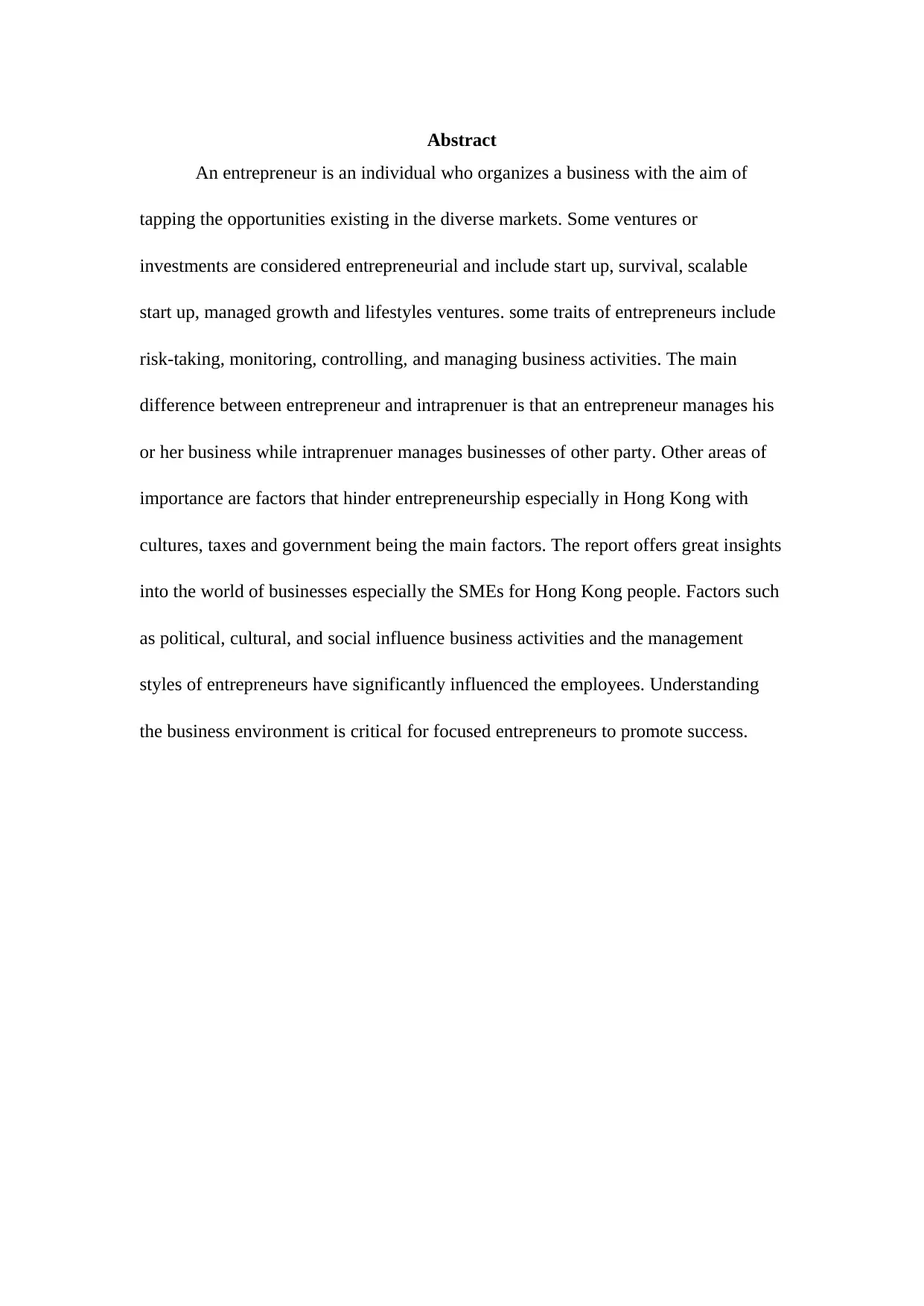
Abstract
An entrepreneur is an individual who organizes a business with the aim of
tapping the opportunities existing in the diverse markets. Some ventures or
investments are considered entrepreneurial and include start up, survival, scalable
start up, managed growth and lifestyles ventures. some traits of entrepreneurs include
risk-taking, monitoring, controlling, and managing business activities. The main
difference between entrepreneur and intraprenuer is that an entrepreneur manages his
or her business while intraprenuer manages businesses of other party. Other areas of
importance are factors that hinder entrepreneurship especially in Hong Kong with
cultures, taxes and government being the main factors. The report offers great insights
into the world of businesses especially the SMEs for Hong Kong people. Factors such
as political, cultural, and social influence business activities and the management
styles of entrepreneurs have significantly influenced the employees. Understanding
the business environment is critical for focused entrepreneurs to promote success.
An entrepreneur is an individual who organizes a business with the aim of
tapping the opportunities existing in the diverse markets. Some ventures or
investments are considered entrepreneurial and include start up, survival, scalable
start up, managed growth and lifestyles ventures. some traits of entrepreneurs include
risk-taking, monitoring, controlling, and managing business activities. The main
difference between entrepreneur and intraprenuer is that an entrepreneur manages his
or her business while intraprenuer manages businesses of other party. Other areas of
importance are factors that hinder entrepreneurship especially in Hong Kong with
cultures, taxes and government being the main factors. The report offers great insights
into the world of businesses especially the SMEs for Hong Kong people. Factors such
as political, cultural, and social influence business activities and the management
styles of entrepreneurs have significantly influenced the employees. Understanding
the business environment is critical for focused entrepreneurs to promote success.
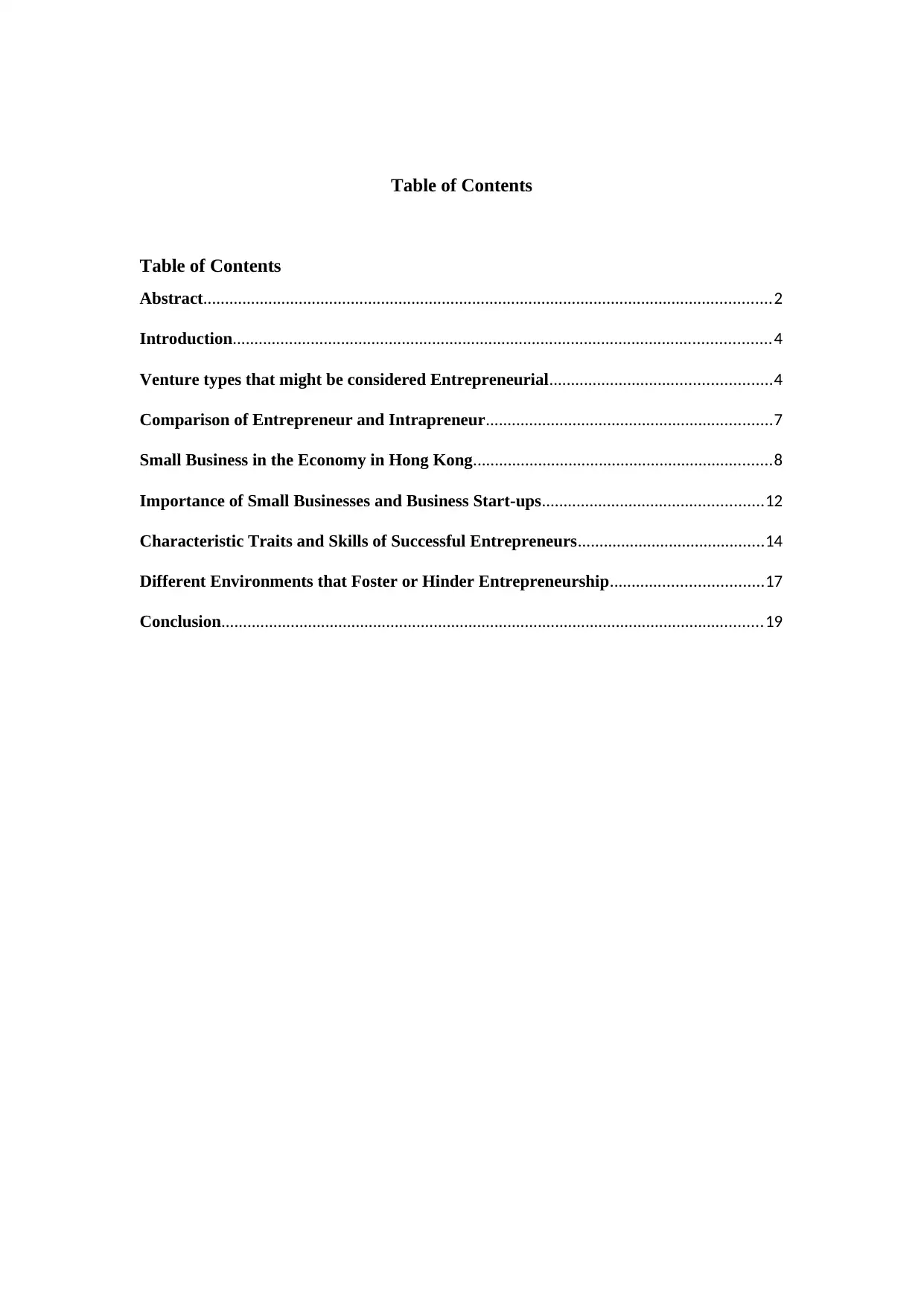
Table of Contents
Table of Contents
Abstract...................................................................................................................................2
Introduction............................................................................................................................4
Venture types that might be considered Entrepreneurial...................................................4
Comparison of Entrepreneur and Intrapreneur..................................................................7
Small Business in the Economy in Hong Kong.....................................................................8
Importance of Small Businesses and Business Start-ups...................................................12
Characteristic Traits and Skills of Successful Entrepreneurs...........................................14
Different Environments that Foster or Hinder Entrepreneurship...................................17
Conclusion.............................................................................................................................19
Table of Contents
Abstract...................................................................................................................................2
Introduction............................................................................................................................4
Venture types that might be considered Entrepreneurial...................................................4
Comparison of Entrepreneur and Intrapreneur..................................................................7
Small Business in the Economy in Hong Kong.....................................................................8
Importance of Small Businesses and Business Start-ups...................................................12
Characteristic Traits and Skills of Successful Entrepreneurs...........................................14
Different Environments that Foster or Hinder Entrepreneurship...................................17
Conclusion.............................................................................................................................19
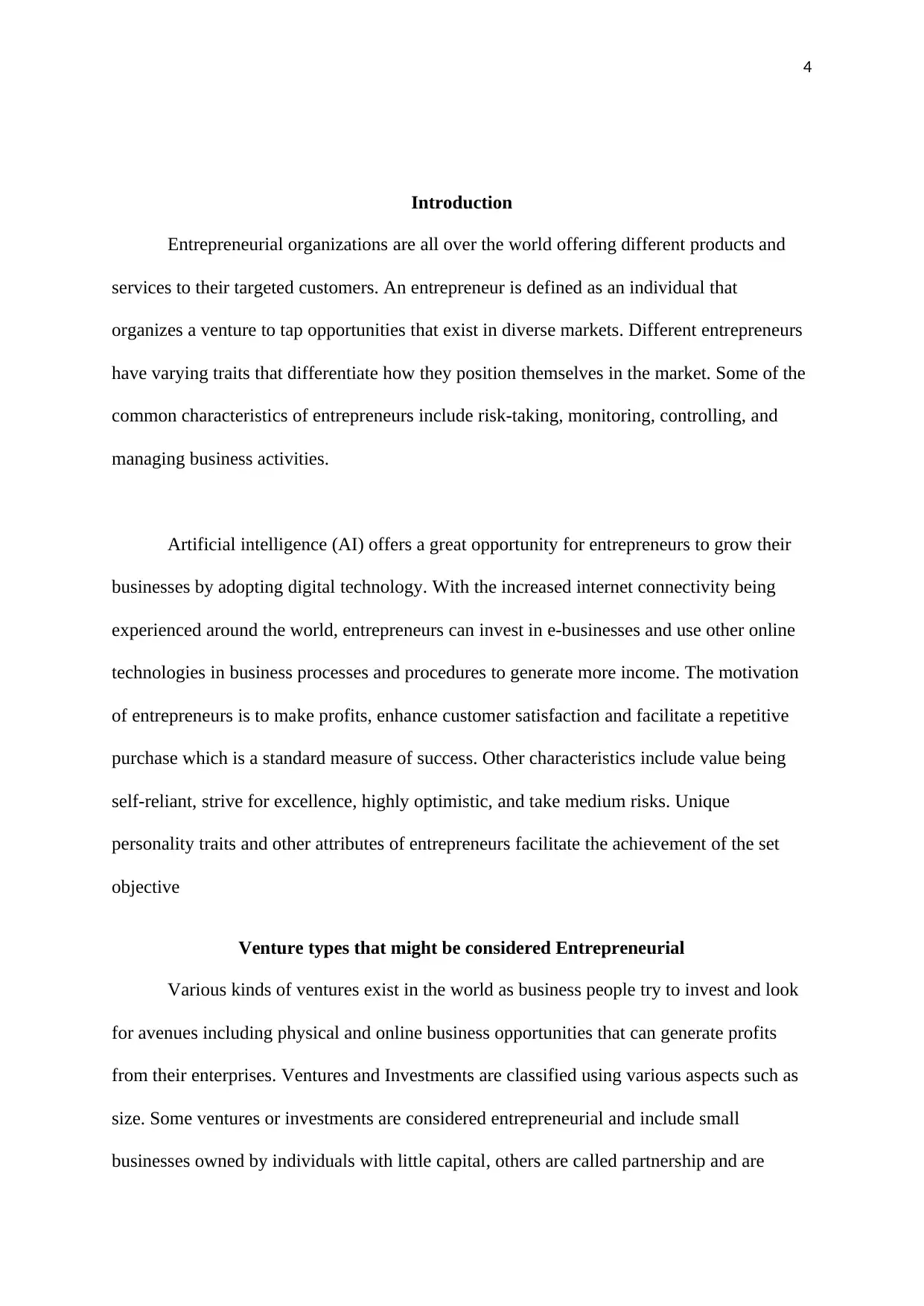
4
Introduction
Entrepreneurial organizations are all over the world offering different products and
services to their targeted customers. An entrepreneur is defined as an individual that
organizes a venture to tap opportunities that exist in diverse markets. Different entrepreneurs
have varying traits that differentiate how they position themselves in the market. Some of the
common characteristics of entrepreneurs include risk-taking, monitoring, controlling, and
managing business activities.
Artificial intelligence (AI) offers a great opportunity for entrepreneurs to grow their
businesses by adopting digital technology. With the increased internet connectivity being
experienced around the world, entrepreneurs can invest in e-businesses and use other online
technologies in business processes and procedures to generate more income. The motivation
of entrepreneurs is to make profits, enhance customer satisfaction and facilitate a repetitive
purchase which is a standard measure of success. Other characteristics include value being
self-reliant, strive for excellence, highly optimistic, and take medium risks. Unique
personality traits and other attributes of entrepreneurs facilitate the achievement of the set
objective
Venture types that might be considered Entrepreneurial
Various kinds of ventures exist in the world as business people try to invest and look
for avenues including physical and online business opportunities that can generate profits
from their enterprises. Ventures and Investments are classified using various aspects such as
size. Some ventures or investments are considered entrepreneurial and include small
businesses owned by individuals with little capital, others are called partnership and are
Introduction
Entrepreneurial organizations are all over the world offering different products and
services to their targeted customers. An entrepreneur is defined as an individual that
organizes a venture to tap opportunities that exist in diverse markets. Different entrepreneurs
have varying traits that differentiate how they position themselves in the market. Some of the
common characteristics of entrepreneurs include risk-taking, monitoring, controlling, and
managing business activities.
Artificial intelligence (AI) offers a great opportunity for entrepreneurs to grow their
businesses by adopting digital technology. With the increased internet connectivity being
experienced around the world, entrepreneurs can invest in e-businesses and use other online
technologies in business processes and procedures to generate more income. The motivation
of entrepreneurs is to make profits, enhance customer satisfaction and facilitate a repetitive
purchase which is a standard measure of success. Other characteristics include value being
self-reliant, strive for excellence, highly optimistic, and take medium risks. Unique
personality traits and other attributes of entrepreneurs facilitate the achievement of the set
objective
Venture types that might be considered Entrepreneurial
Various kinds of ventures exist in the world as business people try to invest and look
for avenues including physical and online business opportunities that can generate profits
from their enterprises. Ventures and Investments are classified using various aspects such as
size. Some ventures or investments are considered entrepreneurial and include small
businesses owned by individuals with little capital, others are called partnership and are
Secure Best Marks with AI Grader
Need help grading? Try our AI Grader for instant feedback on your assignments.
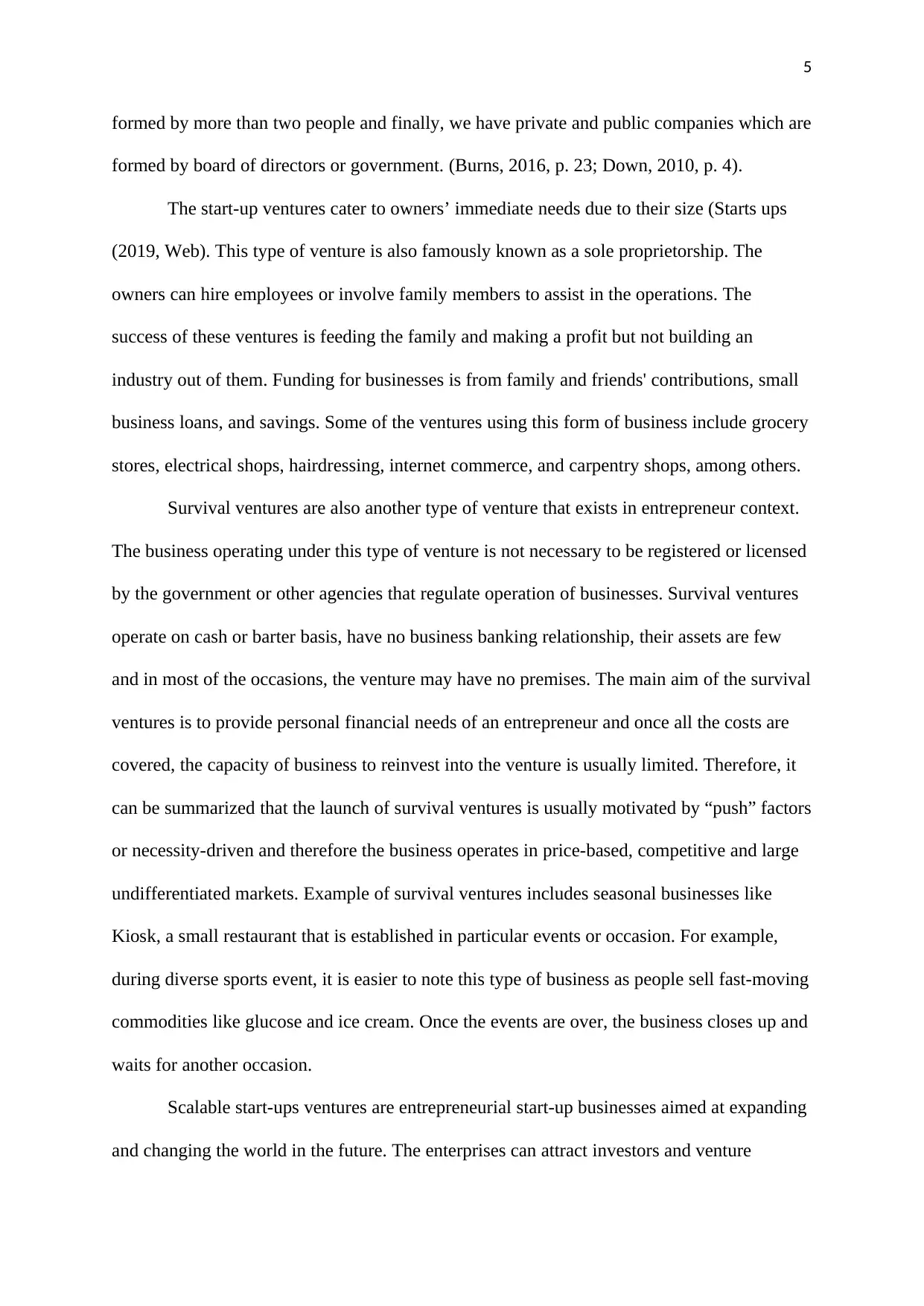
5
formed by more than two people and finally, we have private and public companies which are
formed by board of directors or government. (Burns, 2016, p. 23; Down, 2010, p. 4).
The start-up ventures cater to owners’ immediate needs due to their size (Starts ups
(2019, Web). This type of venture is also famously known as a sole proprietorship. The
owners can hire employees or involve family members to assist in the operations. The
success of these ventures is feeding the family and making a profit but not building an
industry out of them. Funding for businesses is from family and friends' contributions, small
business loans, and savings. Some of the ventures using this form of business include grocery
stores, electrical shops, hairdressing, internet commerce, and carpentry shops, among others.
Survival ventures are also another type of venture that exists in entrepreneur context.
The business operating under this type of venture is not necessary to be registered or licensed
by the government or other agencies that regulate operation of businesses. Survival ventures
operate on cash or barter basis, have no business banking relationship, their assets are few
and in most of the occasions, the venture may have no premises. The main aim of the survival
ventures is to provide personal financial needs of an entrepreneur and once all the costs are
covered, the capacity of business to reinvest into the venture is usually limited. Therefore, it
can be summarized that the launch of survival ventures is usually motivated by “push” factors
or necessity-driven and therefore the business operates in price-based, competitive and large
undifferentiated markets. Example of survival ventures includes seasonal businesses like
Kiosk, a small restaurant that is established in particular events or occasion. For example,
during diverse sports event, it is easier to note this type of business as people sell fast-moving
commodities like glucose and ice cream. Once the events are over, the business closes up and
waits for another occasion.
Scalable start-ups ventures are entrepreneurial start-up businesses aimed at expanding
and changing the world in the future. The enterprises can attract investors and venture
formed by more than two people and finally, we have private and public companies which are
formed by board of directors or government. (Burns, 2016, p. 23; Down, 2010, p. 4).
The start-up ventures cater to owners’ immediate needs due to their size (Starts ups
(2019, Web). This type of venture is also famously known as a sole proprietorship. The
owners can hire employees or involve family members to assist in the operations. The
success of these ventures is feeding the family and making a profit but not building an
industry out of them. Funding for businesses is from family and friends' contributions, small
business loans, and savings. Some of the ventures using this form of business include grocery
stores, electrical shops, hairdressing, internet commerce, and carpentry shops, among others.
Survival ventures are also another type of venture that exists in entrepreneur context.
The business operating under this type of venture is not necessary to be registered or licensed
by the government or other agencies that regulate operation of businesses. Survival ventures
operate on cash or barter basis, have no business banking relationship, their assets are few
and in most of the occasions, the venture may have no premises. The main aim of the survival
ventures is to provide personal financial needs of an entrepreneur and once all the costs are
covered, the capacity of business to reinvest into the venture is usually limited. Therefore, it
can be summarized that the launch of survival ventures is usually motivated by “push” factors
or necessity-driven and therefore the business operates in price-based, competitive and large
undifferentiated markets. Example of survival ventures includes seasonal businesses like
Kiosk, a small restaurant that is established in particular events or occasion. For example,
during diverse sports event, it is easier to note this type of business as people sell fast-moving
commodities like glucose and ice cream. Once the events are over, the business closes up and
waits for another occasion.
Scalable start-ups ventures are entrepreneurial start-up businesses aimed at expanding
and changing the world in the future. The enterprises can attract investors and venture
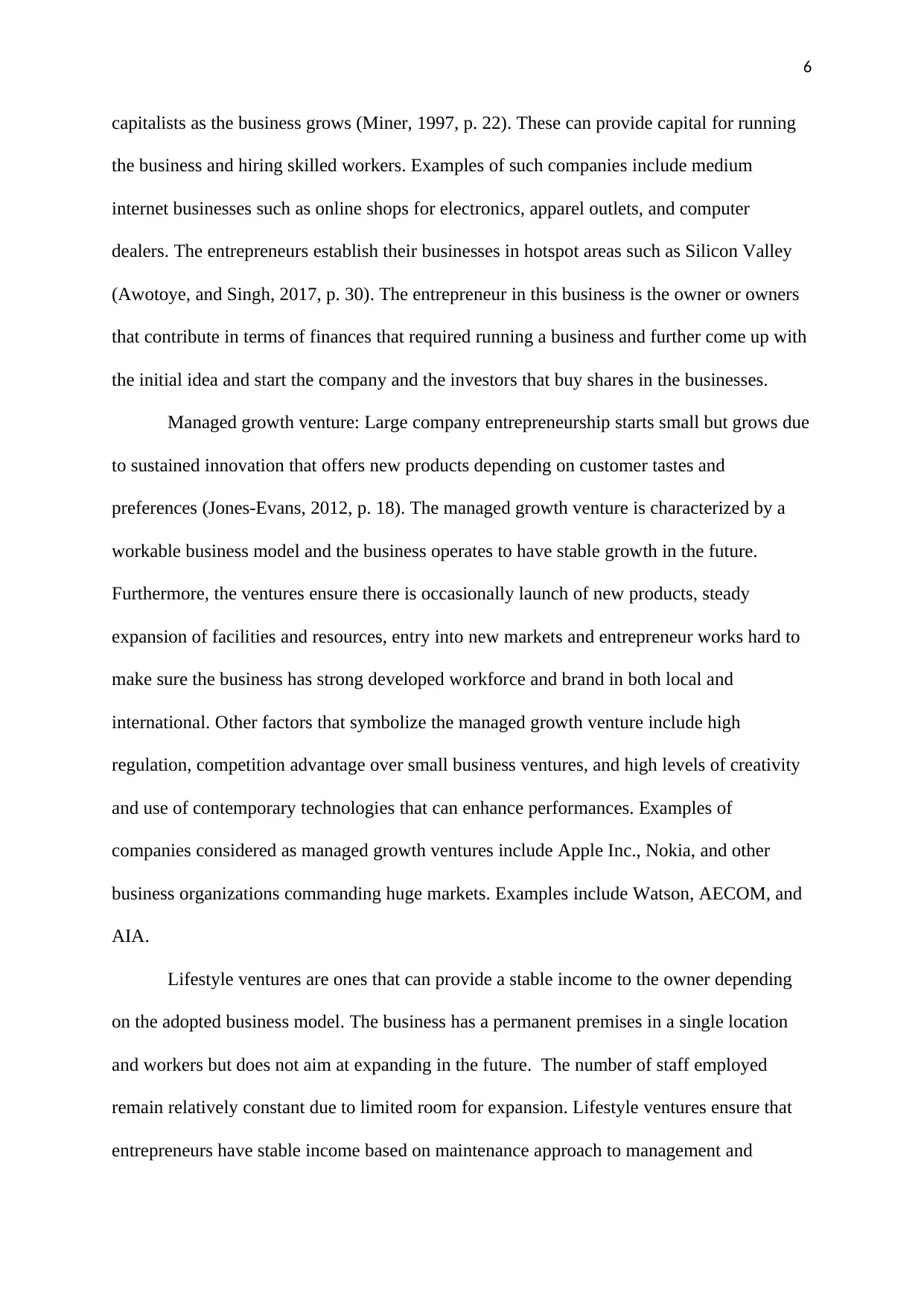
6
capitalists as the business grows (Miner, 1997, p. 22). These can provide capital for running
the business and hiring skilled workers. Examples of such companies include medium
internet businesses such as online shops for electronics, apparel outlets, and computer
dealers. The entrepreneurs establish their businesses in hotspot areas such as Silicon Valley
(Awotoye, and Singh, 2017, p. 30). The entrepreneur in this business is the owner or owners
that contribute in terms of finances that required running a business and further come up with
the initial idea and start the company and the investors that buy shares in the businesses.
Managed growth venture: Large company entrepreneurship starts small but grows due
to sustained innovation that offers new products depending on customer tastes and
preferences (Jones-Evans, 2012, p. 18). The managed growth venture is characterized by a
workable business model and the business operates to have stable growth in the future.
Furthermore, the ventures ensure there is occasionally launch of new products, steady
expansion of facilities and resources, entry into new markets and entrepreneur works hard to
make sure the business has strong developed workforce and brand in both local and
international. Other factors that symbolize the managed growth venture include high
regulation, competition advantage over small business ventures, and high levels of creativity
and use of contemporary technologies that can enhance performances. Examples of
companies considered as managed growth ventures include Apple Inc., Nokia, and other
business organizations commanding huge markets. Examples include Watson, AECOM, and
AIA.
Lifestyle ventures are ones that can provide a stable income to the owner depending
on the adopted business model. The business has a permanent premises in a single location
and workers but does not aim at expanding in the future. The number of staff employed
remain relatively constant due to limited room for expansion. Lifestyle ventures ensure that
entrepreneurs have stable income based on maintenance approach to management and
capitalists as the business grows (Miner, 1997, p. 22). These can provide capital for running
the business and hiring skilled workers. Examples of such companies include medium
internet businesses such as online shops for electronics, apparel outlets, and computer
dealers. The entrepreneurs establish their businesses in hotspot areas such as Silicon Valley
(Awotoye, and Singh, 2017, p. 30). The entrepreneur in this business is the owner or owners
that contribute in terms of finances that required running a business and further come up with
the initial idea and start the company and the investors that buy shares in the businesses.
Managed growth venture: Large company entrepreneurship starts small but grows due
to sustained innovation that offers new products depending on customer tastes and
preferences (Jones-Evans, 2012, p. 18). The managed growth venture is characterized by a
workable business model and the business operates to have stable growth in the future.
Furthermore, the ventures ensure there is occasionally launch of new products, steady
expansion of facilities and resources, entry into new markets and entrepreneur works hard to
make sure the business has strong developed workforce and brand in both local and
international. Other factors that symbolize the managed growth venture include high
regulation, competition advantage over small business ventures, and high levels of creativity
and use of contemporary technologies that can enhance performances. Examples of
companies considered as managed growth ventures include Apple Inc., Nokia, and other
business organizations commanding huge markets. Examples include Watson, AECOM, and
AIA.
Lifestyle ventures are ones that can provide a stable income to the owner depending
on the adopted business model. The business has a permanent premises in a single location
and workers but does not aim at expanding in the future. The number of staff employed
remain relatively constant due to limited room for expansion. Lifestyle ventures ensure that
entrepreneurs have stable income based on maintenance approach to management and
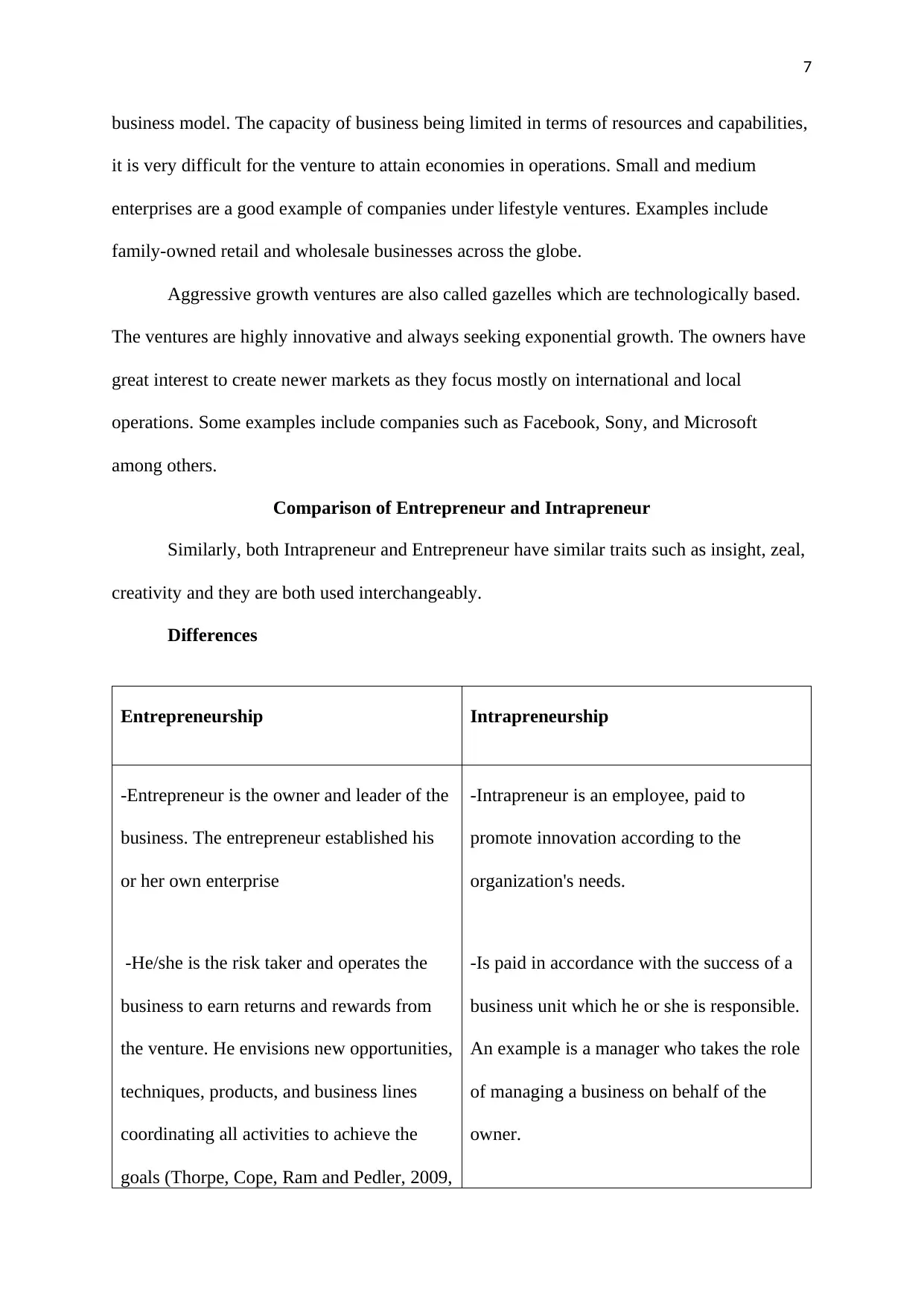
7
business model. The capacity of business being limited in terms of resources and capabilities,
it is very difficult for the venture to attain economies in operations. Small and medium
enterprises are a good example of companies under lifestyle ventures. Examples include
family-owned retail and wholesale businesses across the globe.
Aggressive growth ventures are also called gazelles which are technologically based.
The ventures are highly innovative and always seeking exponential growth. The owners have
great interest to create newer markets as they focus mostly on international and local
operations. Some examples include companies such as Facebook, Sony, and Microsoft
among others.
Comparison of Entrepreneur and Intrapreneur
Similarly, both Intrapreneur and Entrepreneur have similar traits such as insight, zeal,
creativity and they are both used interchangeably.
Differences
Entrepreneurship Intrapreneurship
-Entrepreneur is the owner and leader of the
business. The entrepreneur established his
or her own enterprise
-He/she is the risk taker and operates the
business to earn returns and rewards from
the venture. He envisions new opportunities,
techniques, products, and business lines
coordinating all activities to achieve the
goals (Thorpe, Cope, Ram and Pedler, 2009,
-Intrapreneur is an employee, paid to
promote innovation according to the
organization's needs.
-Is paid in accordance with the success of a
business unit which he or she is responsible.
An example is a manager who takes the role
of managing a business on behalf of the
owner.
business model. The capacity of business being limited in terms of resources and capabilities,
it is very difficult for the venture to attain economies in operations. Small and medium
enterprises are a good example of companies under lifestyle ventures. Examples include
family-owned retail and wholesale businesses across the globe.
Aggressive growth ventures are also called gazelles which are technologically based.
The ventures are highly innovative and always seeking exponential growth. The owners have
great interest to create newer markets as they focus mostly on international and local
operations. Some examples include companies such as Facebook, Sony, and Microsoft
among others.
Comparison of Entrepreneur and Intrapreneur
Similarly, both Intrapreneur and Entrepreneur have similar traits such as insight, zeal,
creativity and they are both used interchangeably.
Differences
Entrepreneurship Intrapreneurship
-Entrepreneur is the owner and leader of the
business. The entrepreneur established his
or her own enterprise
-He/she is the risk taker and operates the
business to earn returns and rewards from
the venture. He envisions new opportunities,
techniques, products, and business lines
coordinating all activities to achieve the
goals (Thorpe, Cope, Ram and Pedler, 2009,
-Intrapreneur is an employee, paid to
promote innovation according to the
organization's needs.
-Is paid in accordance with the success of a
business unit which he or she is responsible.
An example is a manager who takes the role
of managing a business on behalf of the
owner.
Paraphrase This Document
Need a fresh take? Get an instant paraphrase of this document with our AI Paraphraser
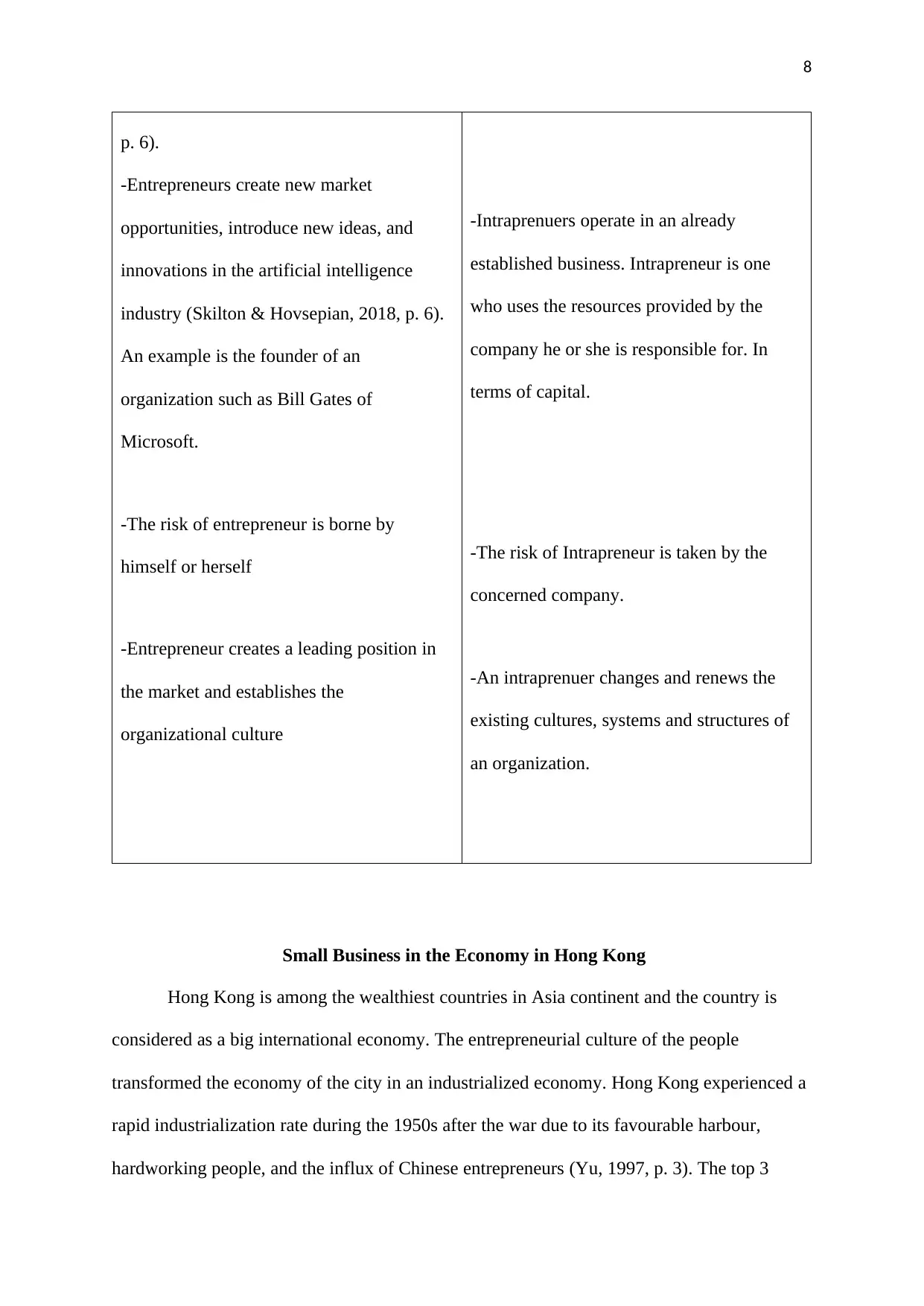
8
p. 6).
-Entrepreneurs create new market
opportunities, introduce new ideas, and
innovations in the artificial intelligence
industry (Skilton & Hovsepian, 2018, p. 6).
An example is the founder of an
organization such as Bill Gates of
Microsoft.
-The risk of entrepreneur is borne by
himself or herself
-Entrepreneur creates a leading position in
the market and establishes the
organizational culture
-Intraprenuers operate in an already
established business. Intrapreneur is one
who uses the resources provided by the
company he or she is responsible for. In
terms of capital.
-The risk of Intrapreneur is taken by the
concerned company.
-An intraprenuer changes and renews the
existing cultures, systems and structures of
an organization.
Small Business in the Economy in Hong Kong
Hong Kong is among the wealthiest countries in Asia continent and the country is
considered as a big international economy. The entrepreneurial culture of the people
transformed the economy of the city in an industrialized economy. Hong Kong experienced a
rapid industrialization rate during the 1950s after the war due to its favourable harbour,
hardworking people, and the influx of Chinese entrepreneurs (Yu, 1997, p. 3). The top 3
p. 6).
-Entrepreneurs create new market
opportunities, introduce new ideas, and
innovations in the artificial intelligence
industry (Skilton & Hovsepian, 2018, p. 6).
An example is the founder of an
organization such as Bill Gates of
Microsoft.
-The risk of entrepreneur is borne by
himself or herself
-Entrepreneur creates a leading position in
the market and establishes the
organizational culture
-Intraprenuers operate in an already
established business. Intrapreneur is one
who uses the resources provided by the
company he or she is responsible for. In
terms of capital.
-The risk of Intrapreneur is taken by the
concerned company.
-An intraprenuer changes and renews the
existing cultures, systems and structures of
an organization.
Small Business in the Economy in Hong Kong
Hong Kong is among the wealthiest countries in Asia continent and the country is
considered as a big international economy. The entrepreneurial culture of the people
transformed the economy of the city in an industrialized economy. Hong Kong experienced a
rapid industrialization rate during the 1950s after the war due to its favourable harbour,
hardworking people, and the influx of Chinese entrepreneurs (Yu, 1997, p. 3). The top 3
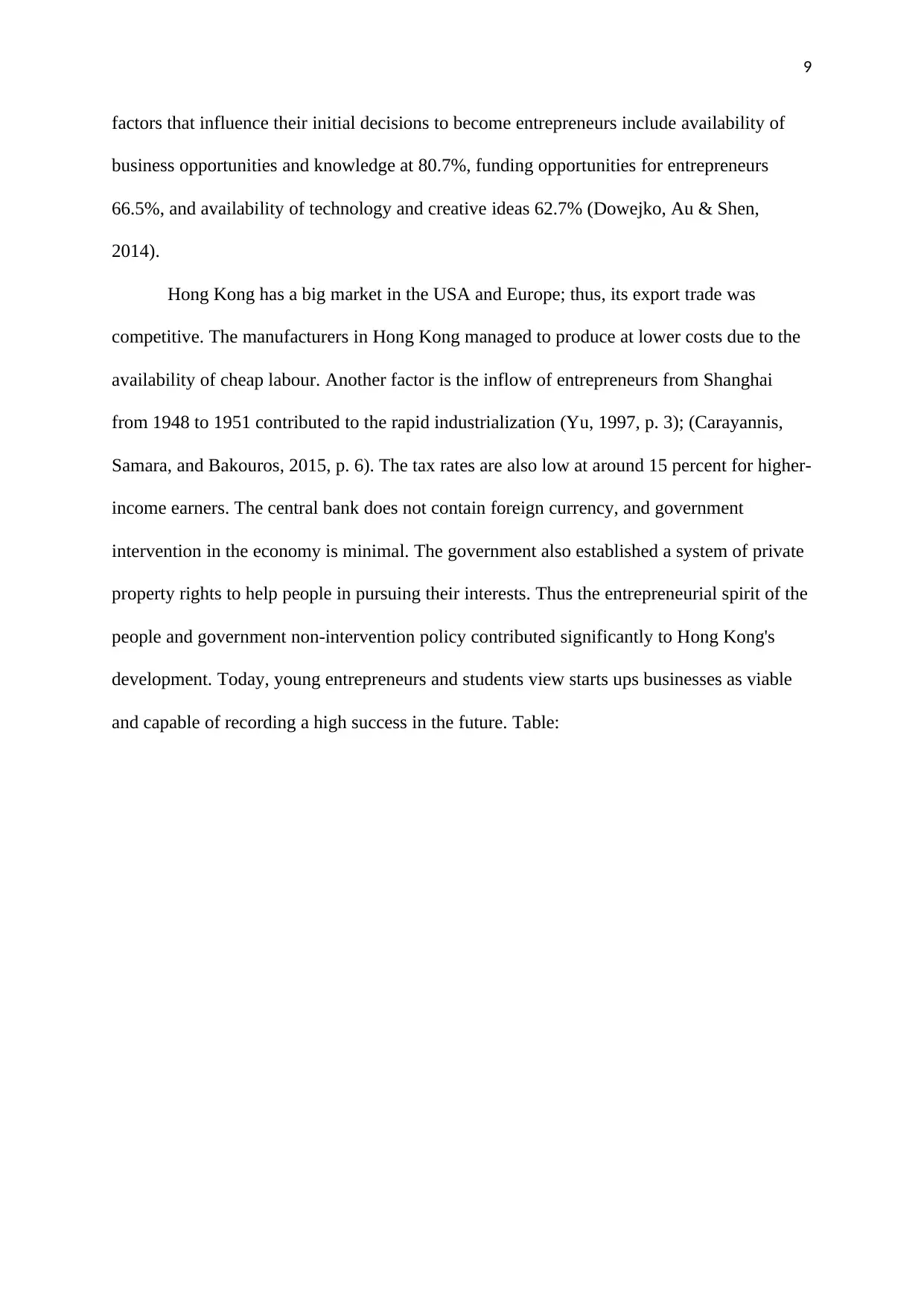
9
factors that influence their initial decisions to become entrepreneurs include availability of
business opportunities and knowledge at 80.7%, funding opportunities for entrepreneurs
66.5%, and availability of technology and creative ideas 62.7% (Dowejko, Au & Shen,
2014).
Hong Kong has a big market in the USA and Europe; thus, its export trade was
competitive. The manufacturers in Hong Kong managed to produce at lower costs due to the
availability of cheap labour. Another factor is the inflow of entrepreneurs from Shanghai
from 1948 to 1951 contributed to the rapid industrialization (Yu, 1997, p. 3); (Carayannis,
Samara, and Bakouros, 2015, p. 6). The tax rates are also low at around 15 percent for higher-
income earners. The central bank does not contain foreign currency, and government
intervention in the economy is minimal. The government also established a system of private
property rights to help people in pursuing their interests. Thus the entrepreneurial spirit of the
people and government non-intervention policy contributed significantly to Hong Kong's
development. Today, young entrepreneurs and students view starts ups businesses as viable
and capable of recording a high success in the future. Table:
factors that influence their initial decisions to become entrepreneurs include availability of
business opportunities and knowledge at 80.7%, funding opportunities for entrepreneurs
66.5%, and availability of technology and creative ideas 62.7% (Dowejko, Au & Shen,
2014).
Hong Kong has a big market in the USA and Europe; thus, its export trade was
competitive. The manufacturers in Hong Kong managed to produce at lower costs due to the
availability of cheap labour. Another factor is the inflow of entrepreneurs from Shanghai
from 1948 to 1951 contributed to the rapid industrialization (Yu, 1997, p. 3); (Carayannis,
Samara, and Bakouros, 2015, p. 6). The tax rates are also low at around 15 percent for higher-
income earners. The central bank does not contain foreign currency, and government
intervention in the economy is minimal. The government also established a system of private
property rights to help people in pursuing their interests. Thus the entrepreneurial spirit of the
people and government non-intervention policy contributed significantly to Hong Kong's
development. Today, young entrepreneurs and students view starts ups businesses as viable
and capable of recording a high success in the future. Table:
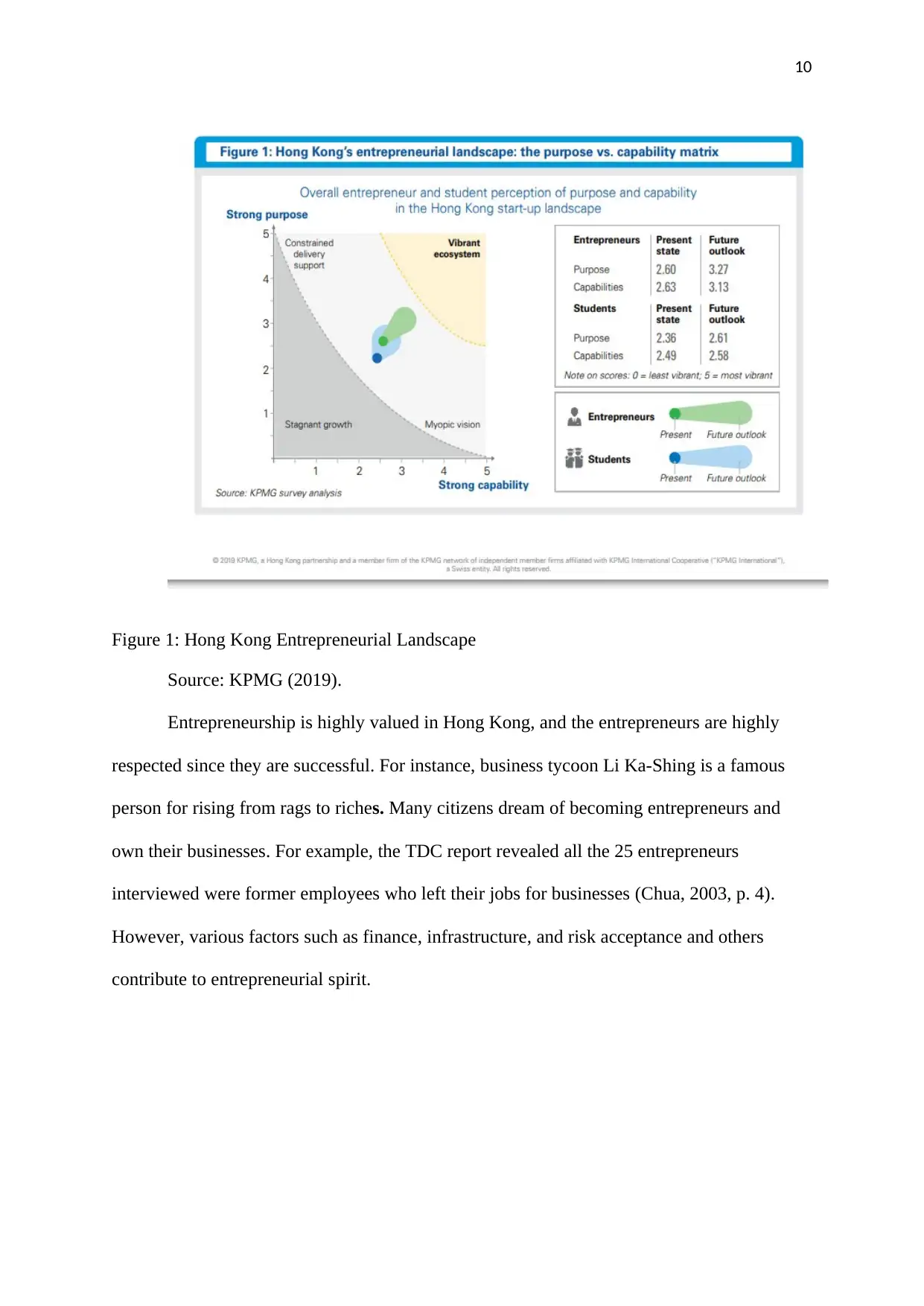
10
Figure 1: Hong Kong Entrepreneurial Landscape
Source: KPMG (2019).
Entrepreneurship is highly valued in Hong Kong, and the entrepreneurs are highly
respected since they are successful. For instance, business tycoon Li Ka-Shing is a famous
person for rising from rags to riches. Many citizens dream of becoming entrepreneurs and
own their businesses. For example, the TDC report revealed all the 25 entrepreneurs
interviewed were former employees who left their jobs for businesses (Chua, 2003, p. 4).
However, various factors such as finance, infrastructure, and risk acceptance and others
contribute to entrepreneurial spirit.
Figure 1: Hong Kong Entrepreneurial Landscape
Source: KPMG (2019).
Entrepreneurship is highly valued in Hong Kong, and the entrepreneurs are highly
respected since they are successful. For instance, business tycoon Li Ka-Shing is a famous
person for rising from rags to riches. Many citizens dream of becoming entrepreneurs and
own their businesses. For example, the TDC report revealed all the 25 entrepreneurs
interviewed were former employees who left their jobs for businesses (Chua, 2003, p. 4).
However, various factors such as finance, infrastructure, and risk acceptance and others
contribute to entrepreneurial spirit.
Secure Best Marks with AI Grader
Need help grading? Try our AI Grader for instant feedback on your assignments.
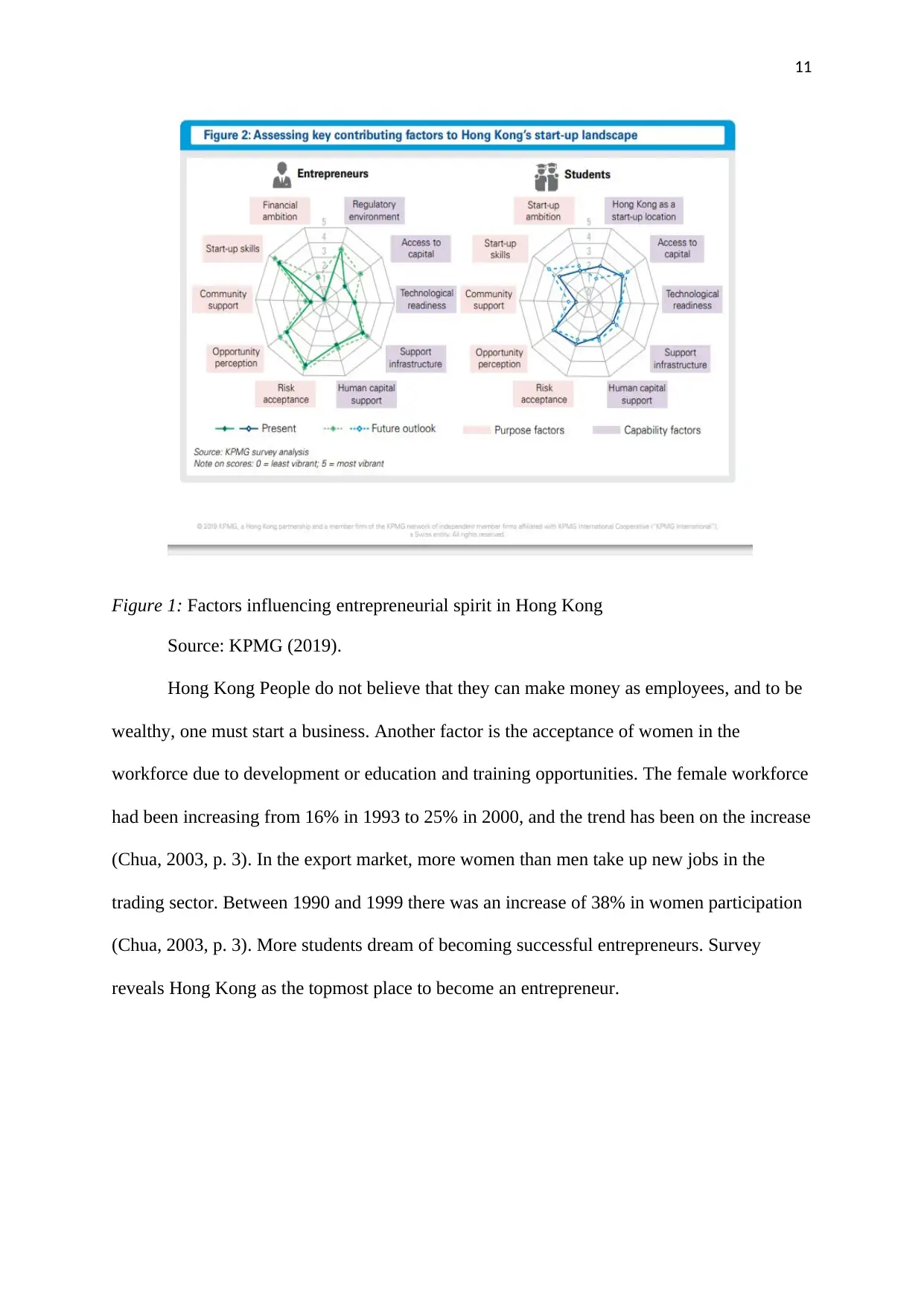
11
Figure 1: Factors influencing entrepreneurial spirit in Hong Kong
Source: KPMG (2019).
Hong Kong People do not believe that they can make money as employees, and to be
wealthy, one must start a business. Another factor is the acceptance of women in the
workforce due to development or education and training opportunities. The female workforce
had been increasing from 16% in 1993 to 25% in 2000, and the trend has been on the increase
(Chua, 2003, p. 3). In the export market, more women than men take up new jobs in the
trading sector. Between 1990 and 1999 there was an increase of 38% in women participation
(Chua, 2003, p. 3). More students dream of becoming successful entrepreneurs. Survey
reveals Hong Kong as the topmost place to become an entrepreneur.
Figure 1: Factors influencing entrepreneurial spirit in Hong Kong
Source: KPMG (2019).
Hong Kong People do not believe that they can make money as employees, and to be
wealthy, one must start a business. Another factor is the acceptance of women in the
workforce due to development or education and training opportunities. The female workforce
had been increasing from 16% in 1993 to 25% in 2000, and the trend has been on the increase
(Chua, 2003, p. 3). In the export market, more women than men take up new jobs in the
trading sector. Between 1990 and 1999 there was an increase of 38% in women participation
(Chua, 2003, p. 3). More students dream of becoming successful entrepreneurs. Survey
reveals Hong Kong as the topmost place to become an entrepreneur.
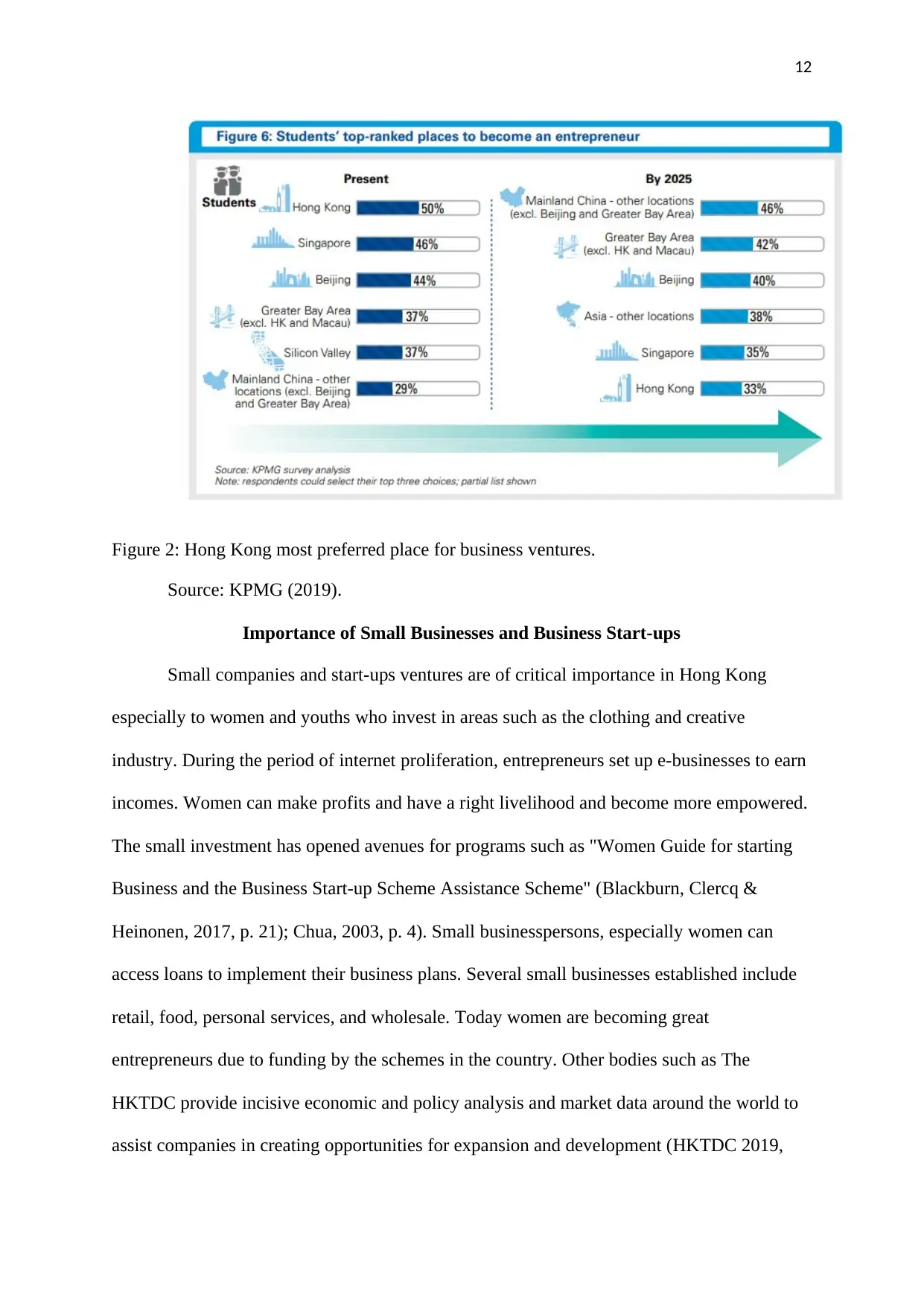
12
Figure 2: Hong Kong most preferred place for business ventures.
Source: KPMG (2019).
Importance of Small Businesses and Business Start-ups
Small companies and start-ups ventures are of critical importance in Hong Kong
especially to women and youths who invest in areas such as the clothing and creative
industry. During the period of internet proliferation, entrepreneurs set up e-businesses to earn
incomes. Women can make profits and have a right livelihood and become more empowered.
The small investment has opened avenues for programs such as "Women Guide for starting
Business and the Business Start-up Scheme Assistance Scheme" (Blackburn, Clercq &
Heinonen, 2017, p. 21); Chua, 2003, p. 4). Small businesspersons, especially women can
access loans to implement their business plans. Several small businesses established include
retail, food, personal services, and wholesale. Today women are becoming great
entrepreneurs due to funding by the schemes in the country. Other bodies such as The
HKTDC provide incisive economic and policy analysis and market data around the world to
assist companies in creating opportunities for expansion and development (HKTDC 2019,
Figure 2: Hong Kong most preferred place for business ventures.
Source: KPMG (2019).
Importance of Small Businesses and Business Start-ups
Small companies and start-ups ventures are of critical importance in Hong Kong
especially to women and youths who invest in areas such as the clothing and creative
industry. During the period of internet proliferation, entrepreneurs set up e-businesses to earn
incomes. Women can make profits and have a right livelihood and become more empowered.
The small investment has opened avenues for programs such as "Women Guide for starting
Business and the Business Start-up Scheme Assistance Scheme" (Blackburn, Clercq &
Heinonen, 2017, p. 21); Chua, 2003, p. 4). Small businesspersons, especially women can
access loans to implement their business plans. Several small businesses established include
retail, food, personal services, and wholesale. Today women are becoming great
entrepreneurs due to funding by the schemes in the country. Other bodies such as The
HKTDC provide incisive economic and policy analysis and market data around the world to
assist companies in creating opportunities for expansion and development (HKTDC 2019,
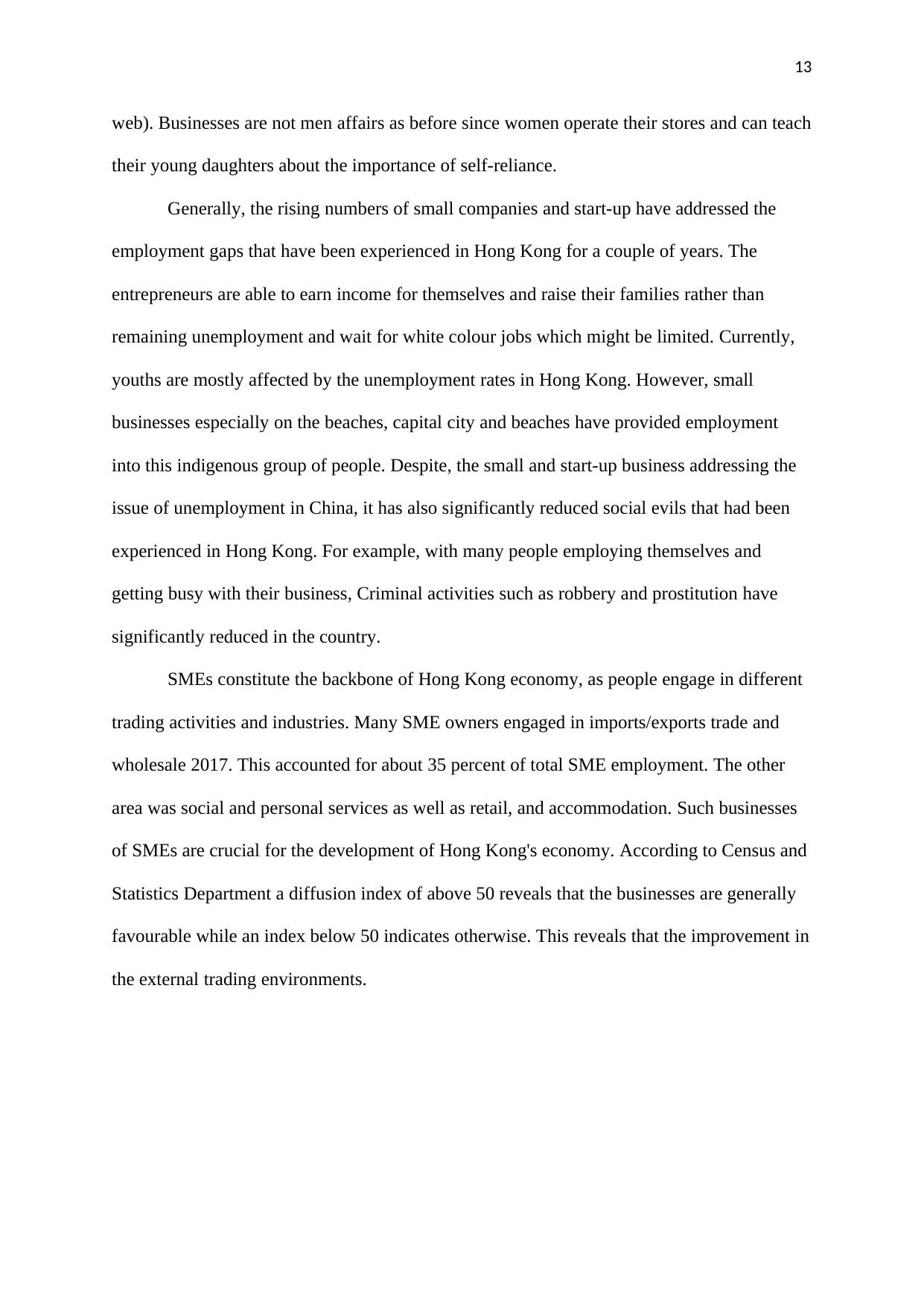
13
web). Businesses are not men affairs as before since women operate their stores and can teach
their young daughters about the importance of self-reliance.
Generally, the rising numbers of small companies and start-up have addressed the
employment gaps that have been experienced in Hong Kong for a couple of years. The
entrepreneurs are able to earn income for themselves and raise their families rather than
remaining unemployment and wait for white colour jobs which might be limited. Currently,
youths are mostly affected by the unemployment rates in Hong Kong. However, small
businesses especially on the beaches, capital city and beaches have provided employment
into this indigenous group of people. Despite, the small and start-up business addressing the
issue of unemployment in China, it has also significantly reduced social evils that had been
experienced in Hong Kong. For example, with many people employing themselves and
getting busy with their business, Criminal activities such as robbery and prostitution have
significantly reduced in the country.
SMEs constitute the backbone of Hong Kong economy, as people engage in different
trading activities and industries. Many SME owners engaged in imports/exports trade and
wholesale 2017. This accounted for about 35 percent of total SME employment. The other
area was social and personal services as well as retail, and accommodation. Such businesses
of SMEs are crucial for the development of Hong Kong's economy. According to Census and
Statistics Department a diffusion index of above 50 reveals that the businesses are generally
favourable while an index below 50 indicates otherwise. This reveals that the improvement in
the external trading environments.
web). Businesses are not men affairs as before since women operate their stores and can teach
their young daughters about the importance of self-reliance.
Generally, the rising numbers of small companies and start-up have addressed the
employment gaps that have been experienced in Hong Kong for a couple of years. The
entrepreneurs are able to earn income for themselves and raise their families rather than
remaining unemployment and wait for white colour jobs which might be limited. Currently,
youths are mostly affected by the unemployment rates in Hong Kong. However, small
businesses especially on the beaches, capital city and beaches have provided employment
into this indigenous group of people. Despite, the small and start-up business addressing the
issue of unemployment in China, it has also significantly reduced social evils that had been
experienced in Hong Kong. For example, with many people employing themselves and
getting busy with their business, Criminal activities such as robbery and prostitution have
significantly reduced in the country.
SMEs constitute the backbone of Hong Kong economy, as people engage in different
trading activities and industries. Many SME owners engaged in imports/exports trade and
wholesale 2017. This accounted for about 35 percent of total SME employment. The other
area was social and personal services as well as retail, and accommodation. Such businesses
of SMEs are crucial for the development of Hong Kong's economy. According to Census and
Statistics Department a diffusion index of above 50 reveals that the businesses are generally
favourable while an index below 50 indicates otherwise. This reveals that the improvement in
the external trading environments.
Paraphrase This Document
Need a fresh take? Get an instant paraphrase of this document with our AI Paraphraser
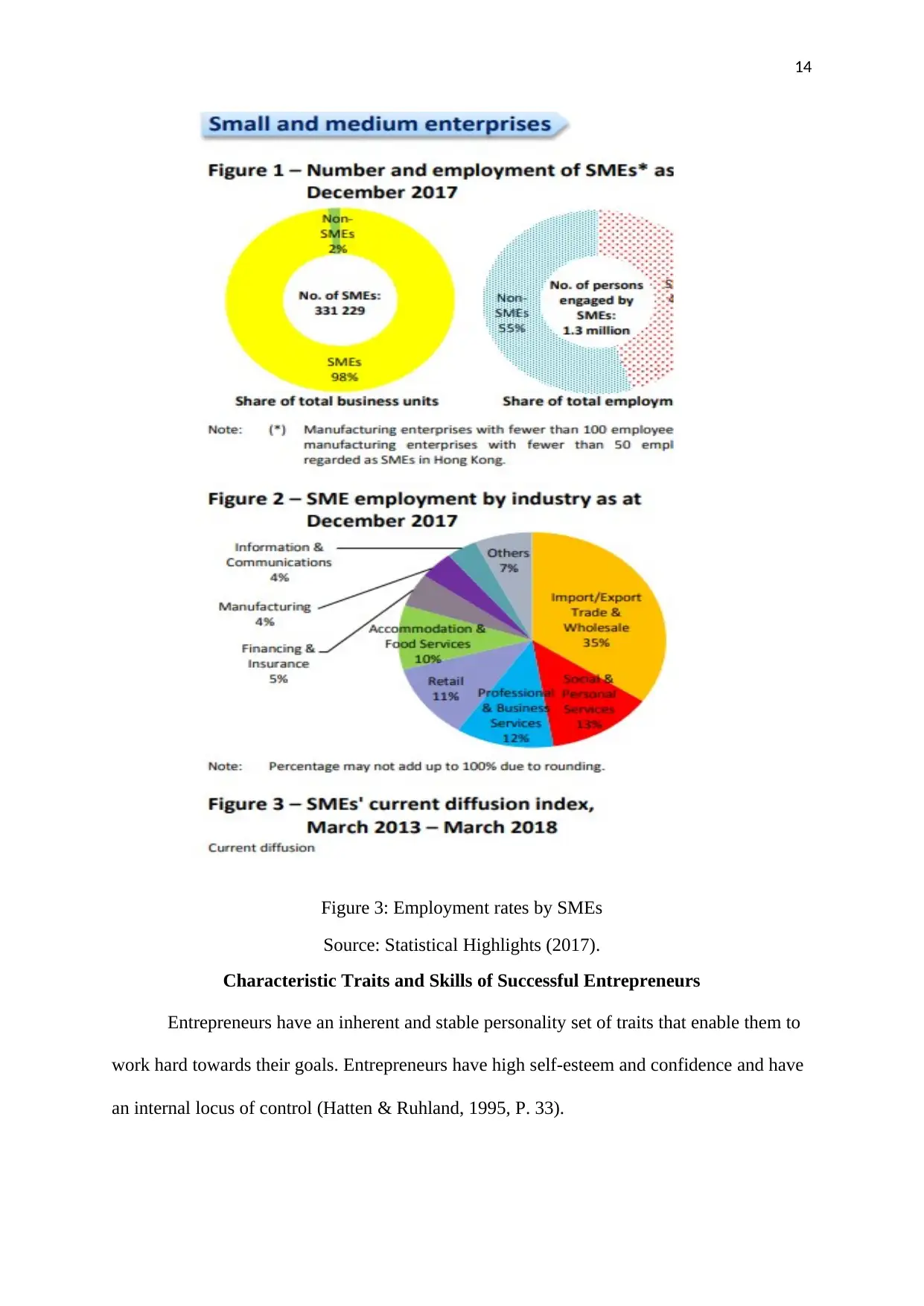
14
Figure 3: Employment rates by SMEs
Source: Statistical Highlights (2017).
Characteristic Traits and Skills of Successful Entrepreneurs
Entrepreneurs have an inherent and stable personality set of traits that enable them to
work hard towards their goals. Entrepreneurs have high self-esteem and confidence and have
an internal locus of control (Hatten & Ruhland, 1995, P. 33).
Figure 3: Employment rates by SMEs
Source: Statistical Highlights (2017).
Characteristic Traits and Skills of Successful Entrepreneurs
Entrepreneurs have an inherent and stable personality set of traits that enable them to
work hard towards their goals. Entrepreneurs have high self-esteem and confidence and have
an internal locus of control (Hatten & Ruhland, 1995, P. 33).
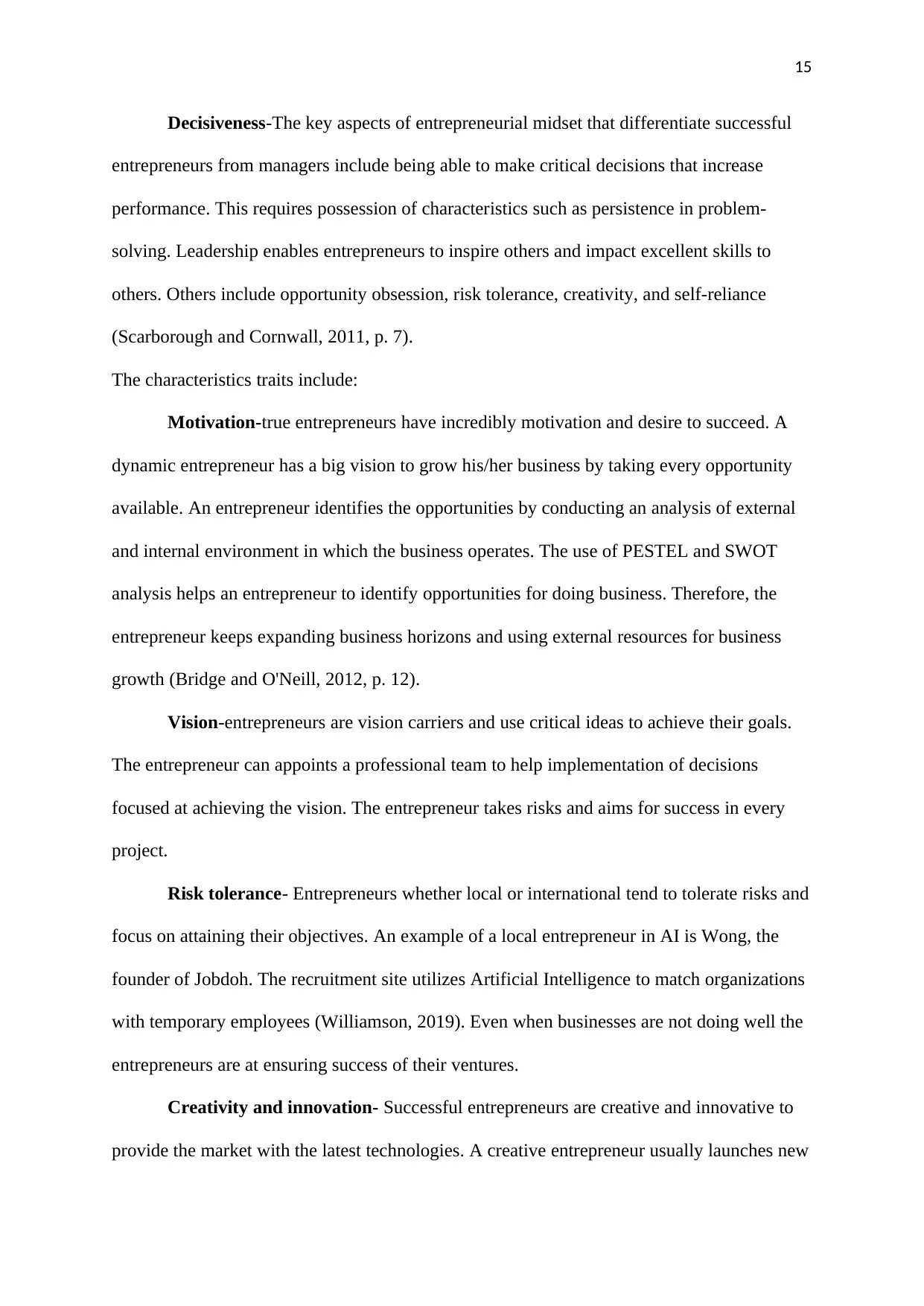
15
Decisiveness-The key aspects of entrepreneurial midset that differentiate successful
entrepreneurs from managers include being able to make critical decisions that increase
performance. This requires possession of characteristics such as persistence in problem-
solving. Leadership enables entrepreneurs to inspire others and impact excellent skills to
others. Others include opportunity obsession, risk tolerance, creativity, and self-reliance
(Scarborough and Cornwall, 2011, p. 7).
The characteristics traits include:
Motivation-true entrepreneurs have incredibly motivation and desire to succeed. A
dynamic entrepreneur has a big vision to grow his/her business by taking every opportunity
available. An entrepreneur identifies the opportunities by conducting an analysis of external
and internal environment in which the business operates. The use of PESTEL and SWOT
analysis helps an entrepreneur to identify opportunities for doing business. Therefore, the
entrepreneur keeps expanding business horizons and using external resources for business
growth (Bridge and O'Neill, 2012, p. 12).
Vision-entrepreneurs are vision carriers and use critical ideas to achieve their goals.
The entrepreneur can appoints a professional team to help implementation of decisions
focused at achieving the vision. The entrepreneur takes risks and aims for success in every
project.
Risk tolerance- Entrepreneurs whether local or international tend to tolerate risks and
focus on attaining their objectives. An example of a local entrepreneur in AI is Wong, the
founder of Jobdoh. The recruitment site utilizes Artificial Intelligence to match organizations
with temporary employees (Williamson, 2019). Even when businesses are not doing well the
entrepreneurs are at ensuring success of their ventures.
Creativity and innovation- Successful entrepreneurs are creative and innovative to
provide the market with the latest technologies. A creative entrepreneur usually launches new
Decisiveness-The key aspects of entrepreneurial midset that differentiate successful
entrepreneurs from managers include being able to make critical decisions that increase
performance. This requires possession of characteristics such as persistence in problem-
solving. Leadership enables entrepreneurs to inspire others and impact excellent skills to
others. Others include opportunity obsession, risk tolerance, creativity, and self-reliance
(Scarborough and Cornwall, 2011, p. 7).
The characteristics traits include:
Motivation-true entrepreneurs have incredibly motivation and desire to succeed. A
dynamic entrepreneur has a big vision to grow his/her business by taking every opportunity
available. An entrepreneur identifies the opportunities by conducting an analysis of external
and internal environment in which the business operates. The use of PESTEL and SWOT
analysis helps an entrepreneur to identify opportunities for doing business. Therefore, the
entrepreneur keeps expanding business horizons and using external resources for business
growth (Bridge and O'Neill, 2012, p. 12).
Vision-entrepreneurs are vision carriers and use critical ideas to achieve their goals.
The entrepreneur can appoints a professional team to help implementation of decisions
focused at achieving the vision. The entrepreneur takes risks and aims for success in every
project.
Risk tolerance- Entrepreneurs whether local or international tend to tolerate risks and
focus on attaining their objectives. An example of a local entrepreneur in AI is Wong, the
founder of Jobdoh. The recruitment site utilizes Artificial Intelligence to match organizations
with temporary employees (Williamson, 2019). Even when businesses are not doing well the
entrepreneurs are at ensuring success of their ventures.
Creativity and innovation- Successful entrepreneurs are creative and innovative to
provide the market with the latest technologies. A creative entrepreneur usually launches new
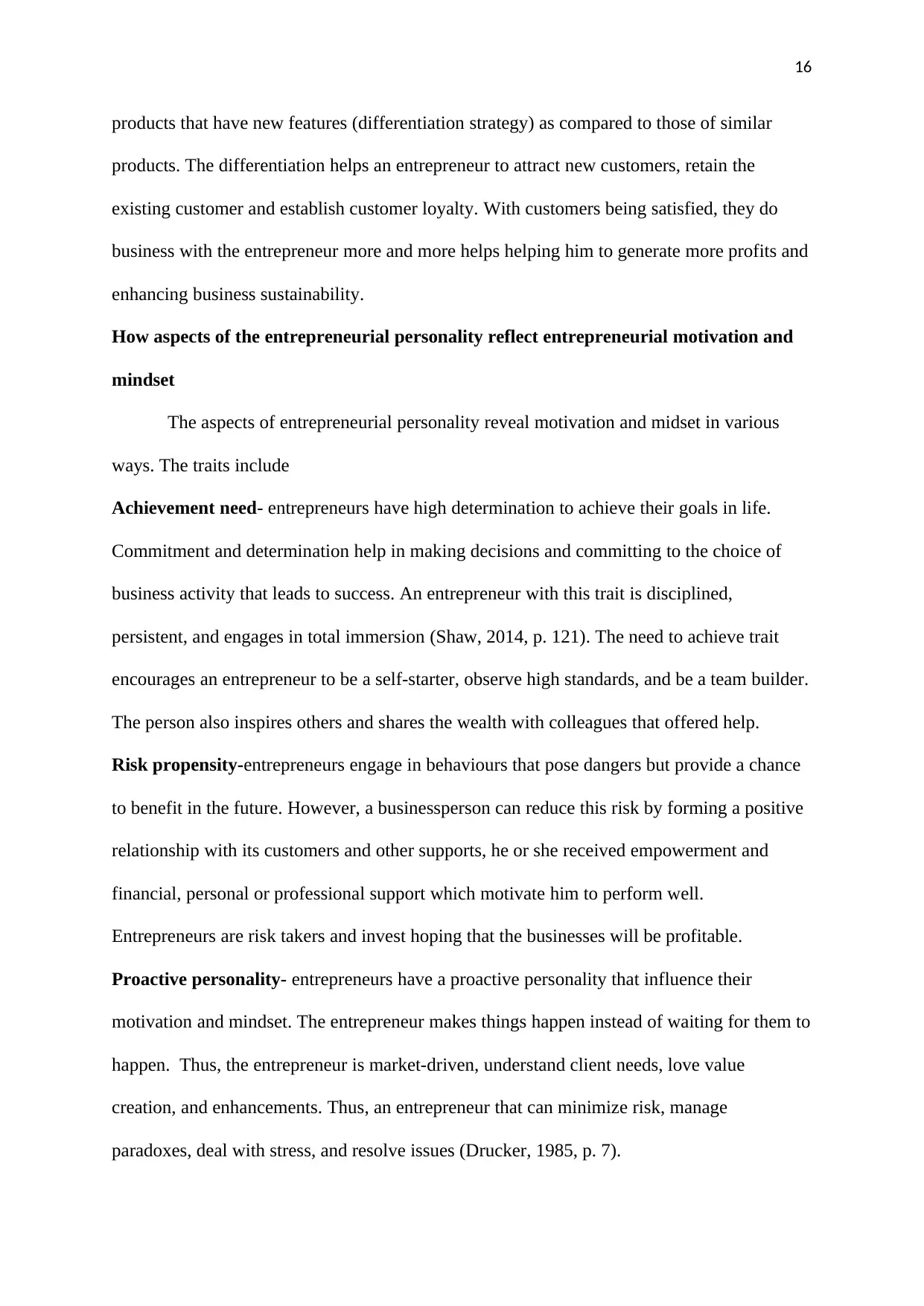
16
products that have new features (differentiation strategy) as compared to those of similar
products. The differentiation helps an entrepreneur to attract new customers, retain the
existing customer and establish customer loyalty. With customers being satisfied, they do
business with the entrepreneur more and more helps helping him to generate more profits and
enhancing business sustainability.
How aspects of the entrepreneurial personality reflect entrepreneurial motivation and
mindset
The aspects of entrepreneurial personality reveal motivation and midset in various
ways. The traits include
Achievement need- entrepreneurs have high determination to achieve their goals in life.
Commitment and determination help in making decisions and committing to the choice of
business activity that leads to success. An entrepreneur with this trait is disciplined,
persistent, and engages in total immersion (Shaw, 2014, p. 121). The need to achieve trait
encourages an entrepreneur to be a self-starter, observe high standards, and be a team builder.
The person also inspires others and shares the wealth with colleagues that offered help.
Risk propensity-entrepreneurs engage in behaviours that pose dangers but provide a chance
to benefit in the future. However, a businessperson can reduce this risk by forming a positive
relationship with its customers and other supports, he or she received empowerment and
financial, personal or professional support which motivate him to perform well.
Entrepreneurs are risk takers and invest hoping that the businesses will be profitable.
Proactive personality- entrepreneurs have a proactive personality that influence their
motivation and mindset. The entrepreneur makes things happen instead of waiting for them to
happen. Thus, the entrepreneur is market-driven, understand client needs, love value
creation, and enhancements. Thus, an entrepreneur that can minimize risk, manage
paradoxes, deal with stress, and resolve issues (Drucker, 1985, p. 7).
products that have new features (differentiation strategy) as compared to those of similar
products. The differentiation helps an entrepreneur to attract new customers, retain the
existing customer and establish customer loyalty. With customers being satisfied, they do
business with the entrepreneur more and more helps helping him to generate more profits and
enhancing business sustainability.
How aspects of the entrepreneurial personality reflect entrepreneurial motivation and
mindset
The aspects of entrepreneurial personality reveal motivation and midset in various
ways. The traits include
Achievement need- entrepreneurs have high determination to achieve their goals in life.
Commitment and determination help in making decisions and committing to the choice of
business activity that leads to success. An entrepreneur with this trait is disciplined,
persistent, and engages in total immersion (Shaw, 2014, p. 121). The need to achieve trait
encourages an entrepreneur to be a self-starter, observe high standards, and be a team builder.
The person also inspires others and shares the wealth with colleagues that offered help.
Risk propensity-entrepreneurs engage in behaviours that pose dangers but provide a chance
to benefit in the future. However, a businessperson can reduce this risk by forming a positive
relationship with its customers and other supports, he or she received empowerment and
financial, personal or professional support which motivate him to perform well.
Entrepreneurs are risk takers and invest hoping that the businesses will be profitable.
Proactive personality- entrepreneurs have a proactive personality that influence their
motivation and mindset. The entrepreneur makes things happen instead of waiting for them to
happen. Thus, the entrepreneur is market-driven, understand client needs, love value
creation, and enhancements. Thus, an entrepreneur that can minimize risk, manage
paradoxes, deal with stress, and resolve issues (Drucker, 1985, p. 7).
Secure Best Marks with AI Grader
Need help grading? Try our AI Grader for instant feedback on your assignments.
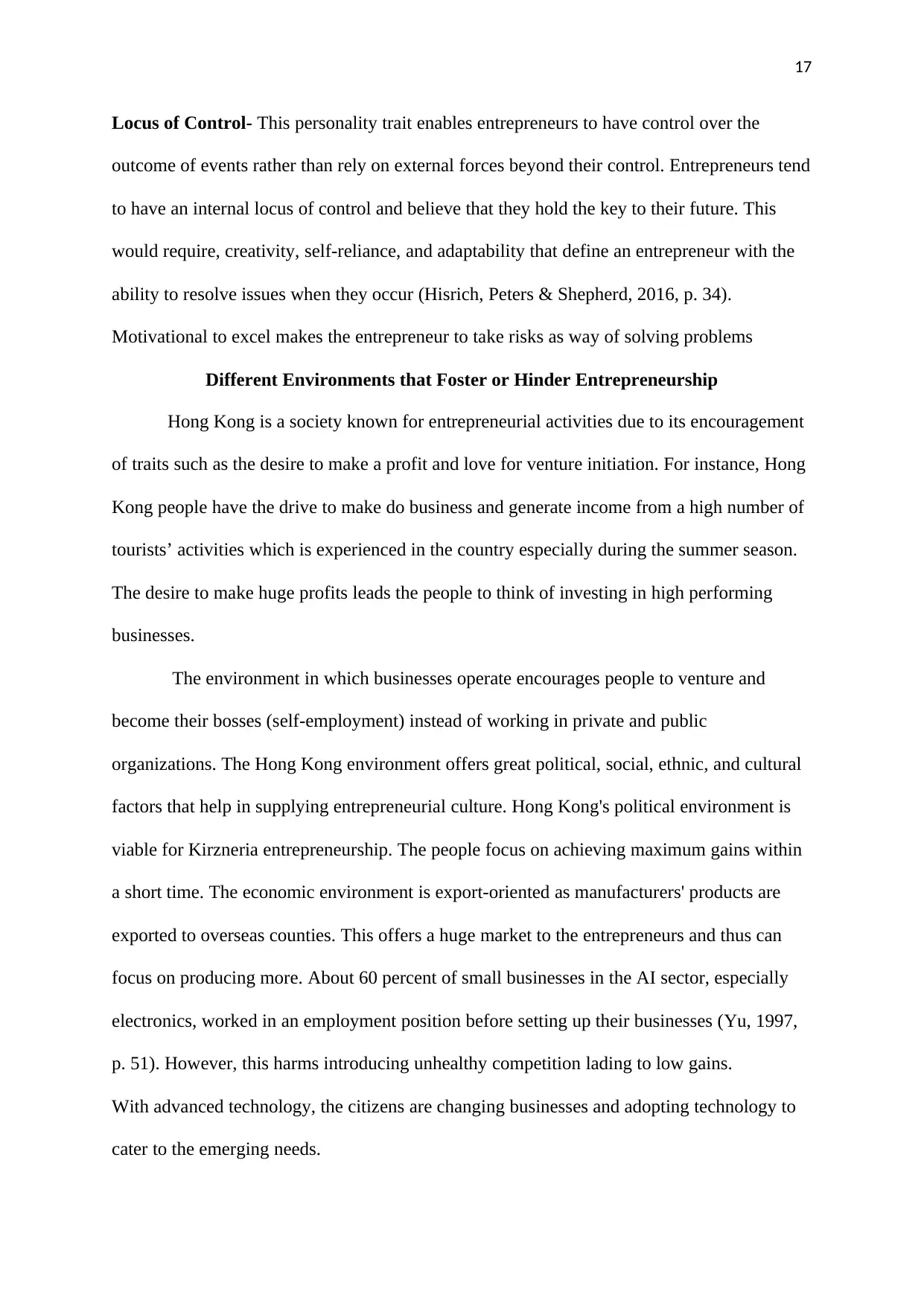
17
Locus of Control- This personality trait enables entrepreneurs to have control over the
outcome of events rather than rely on external forces beyond their control. Entrepreneurs tend
to have an internal locus of control and believe that they hold the key to their future. This
would require, creativity, self-reliance, and adaptability that define an entrepreneur with the
ability to resolve issues when they occur (Hisrich, Peters & Shepherd, 2016, p. 34).
Motivational to excel makes the entrepreneur to take risks as way of solving problems
Different Environments that Foster or Hinder Entrepreneurship
Hong Kong is a society known for entrepreneurial activities due to its encouragement
of traits such as the desire to make a profit and love for venture initiation. For instance, Hong
Kong people have the drive to make do business and generate income from a high number of
tourists’ activities which is experienced in the country especially during the summer season.
The desire to make huge profits leads the people to think of investing in high performing
businesses.
The environment in which businesses operate encourages people to venture and
become their bosses (self-employment) instead of working in private and public
organizations. The Hong Kong environment offers great political, social, ethnic, and cultural
factors that help in supplying entrepreneurial culture. Hong Kong's political environment is
viable for Kirzneria entrepreneurship. The people focus on achieving maximum gains within
a short time. The economic environment is export-oriented as manufacturers' products are
exported to overseas counties. This offers a huge market to the entrepreneurs and thus can
focus on producing more. About 60 percent of small businesses in the AI sector, especially
electronics, worked in an employment position before setting up their businesses (Yu, 1997,
p. 51). However, this harms introducing unhealthy competition lading to low gains.
With advanced technology, the citizens are changing businesses and adopting technology to
cater to the emerging needs.
Locus of Control- This personality trait enables entrepreneurs to have control over the
outcome of events rather than rely on external forces beyond their control. Entrepreneurs tend
to have an internal locus of control and believe that they hold the key to their future. This
would require, creativity, self-reliance, and adaptability that define an entrepreneur with the
ability to resolve issues when they occur (Hisrich, Peters & Shepherd, 2016, p. 34).
Motivational to excel makes the entrepreneur to take risks as way of solving problems
Different Environments that Foster or Hinder Entrepreneurship
Hong Kong is a society known for entrepreneurial activities due to its encouragement
of traits such as the desire to make a profit and love for venture initiation. For instance, Hong
Kong people have the drive to make do business and generate income from a high number of
tourists’ activities which is experienced in the country especially during the summer season.
The desire to make huge profits leads the people to think of investing in high performing
businesses.
The environment in which businesses operate encourages people to venture and
become their bosses (self-employment) instead of working in private and public
organizations. The Hong Kong environment offers great political, social, ethnic, and cultural
factors that help in supplying entrepreneurial culture. Hong Kong's political environment is
viable for Kirzneria entrepreneurship. The people focus on achieving maximum gains within
a short time. The economic environment is export-oriented as manufacturers' products are
exported to overseas counties. This offers a huge market to the entrepreneurs and thus can
focus on producing more. About 60 percent of small businesses in the AI sector, especially
electronics, worked in an employment position before setting up their businesses (Yu, 1997,
p. 51). However, this harms introducing unhealthy competition lading to low gains.
With advanced technology, the citizens are changing businesses and adopting technology to
cater to the emerging needs.
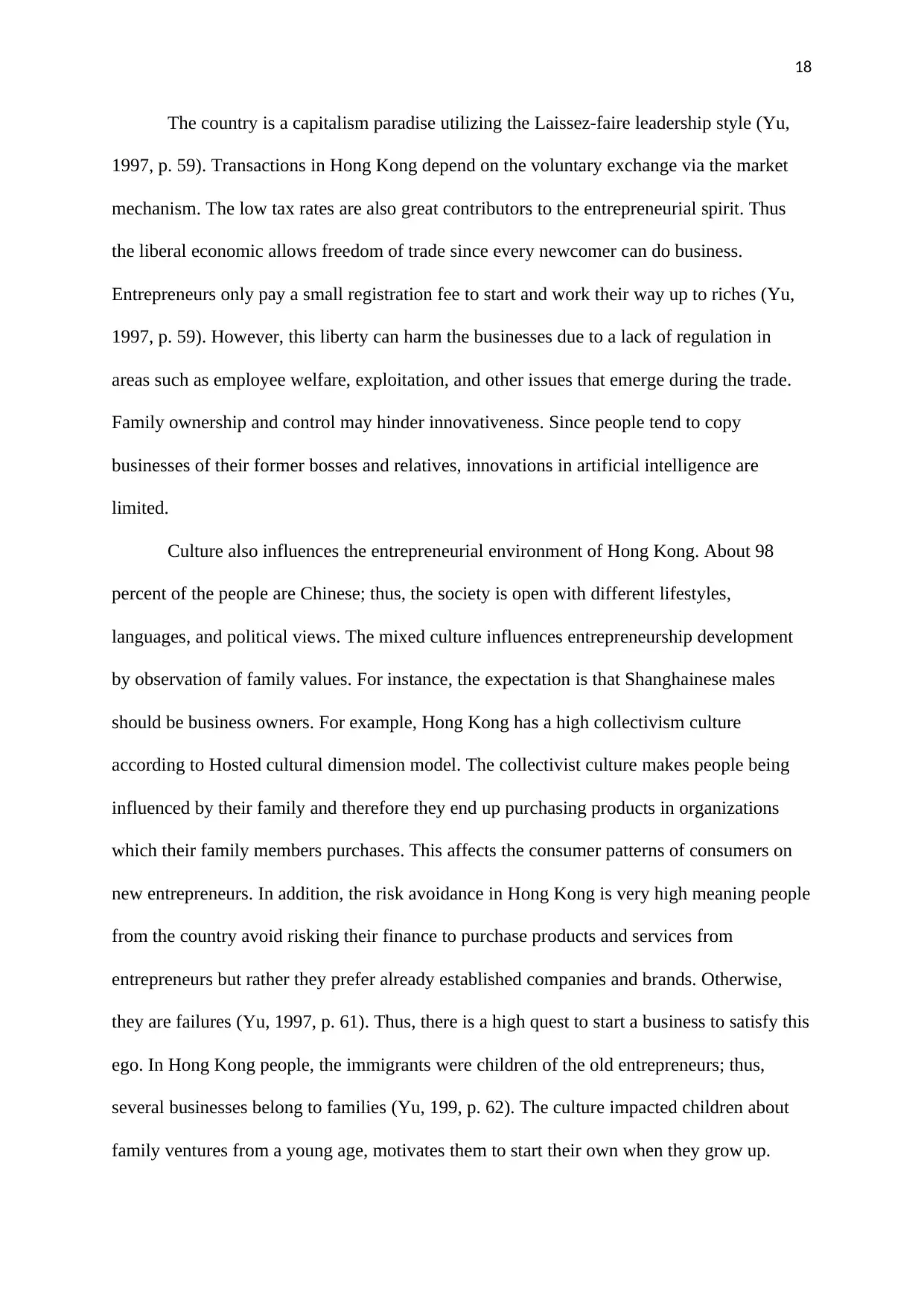
18
The country is a capitalism paradise utilizing the Laissez-faire leadership style (Yu,
1997, p. 59). Transactions in Hong Kong depend on the voluntary exchange via the market
mechanism. The low tax rates are also great contributors to the entrepreneurial spirit. Thus
the liberal economic allows freedom of trade since every newcomer can do business.
Entrepreneurs only pay a small registration fee to start and work their way up to riches (Yu,
1997, p. 59). However, this liberty can harm the businesses due to a lack of regulation in
areas such as employee welfare, exploitation, and other issues that emerge during the trade.
Family ownership and control may hinder innovativeness. Since people tend to copy
businesses of their former bosses and relatives, innovations in artificial intelligence are
limited.
Culture also influences the entrepreneurial environment of Hong Kong. About 98
percent of the people are Chinese; thus, the society is open with different lifestyles,
languages, and political views. The mixed culture influences entrepreneurship development
by observation of family values. For instance, the expectation is that Shanghainese males
should be business owners. For example, Hong Kong has a high collectivism culture
according to Hosted cultural dimension model. The collectivist culture makes people being
influenced by their family and therefore they end up purchasing products in organizations
which their family members purchases. This affects the consumer patterns of consumers on
new entrepreneurs. In addition, the risk avoidance in Hong Kong is very high meaning people
from the country avoid risking their finance to purchase products and services from
entrepreneurs but rather they prefer already established companies and brands. Otherwise,
they are failures (Yu, 1997, p. 61). Thus, there is a high quest to start a business to satisfy this
ego. In Hong Kong people, the immigrants were children of the old entrepreneurs; thus,
several businesses belong to families (Yu, 199, p. 62). The culture impacted children about
family ventures from a young age, motivates them to start their own when they grow up.
The country is a capitalism paradise utilizing the Laissez-faire leadership style (Yu,
1997, p. 59). Transactions in Hong Kong depend on the voluntary exchange via the market
mechanism. The low tax rates are also great contributors to the entrepreneurial spirit. Thus
the liberal economic allows freedom of trade since every newcomer can do business.
Entrepreneurs only pay a small registration fee to start and work their way up to riches (Yu,
1997, p. 59). However, this liberty can harm the businesses due to a lack of regulation in
areas such as employee welfare, exploitation, and other issues that emerge during the trade.
Family ownership and control may hinder innovativeness. Since people tend to copy
businesses of their former bosses and relatives, innovations in artificial intelligence are
limited.
Culture also influences the entrepreneurial environment of Hong Kong. About 98
percent of the people are Chinese; thus, the society is open with different lifestyles,
languages, and political views. The mixed culture influences entrepreneurship development
by observation of family values. For instance, the expectation is that Shanghainese males
should be business owners. For example, Hong Kong has a high collectivism culture
according to Hosted cultural dimension model. The collectivist culture makes people being
influenced by their family and therefore they end up purchasing products in organizations
which their family members purchases. This affects the consumer patterns of consumers on
new entrepreneurs. In addition, the risk avoidance in Hong Kong is very high meaning people
from the country avoid risking their finance to purchase products and services from
entrepreneurs but rather they prefer already established companies and brands. Otherwise,
they are failures (Yu, 1997, p. 61). Thus, there is a high quest to start a business to satisfy this
ego. In Hong Kong people, the immigrants were children of the old entrepreneurs; thus,
several businesses belong to families (Yu, 199, p. 62). The culture impacted children about
family ventures from a young age, motivates them to start their own when they grow up.
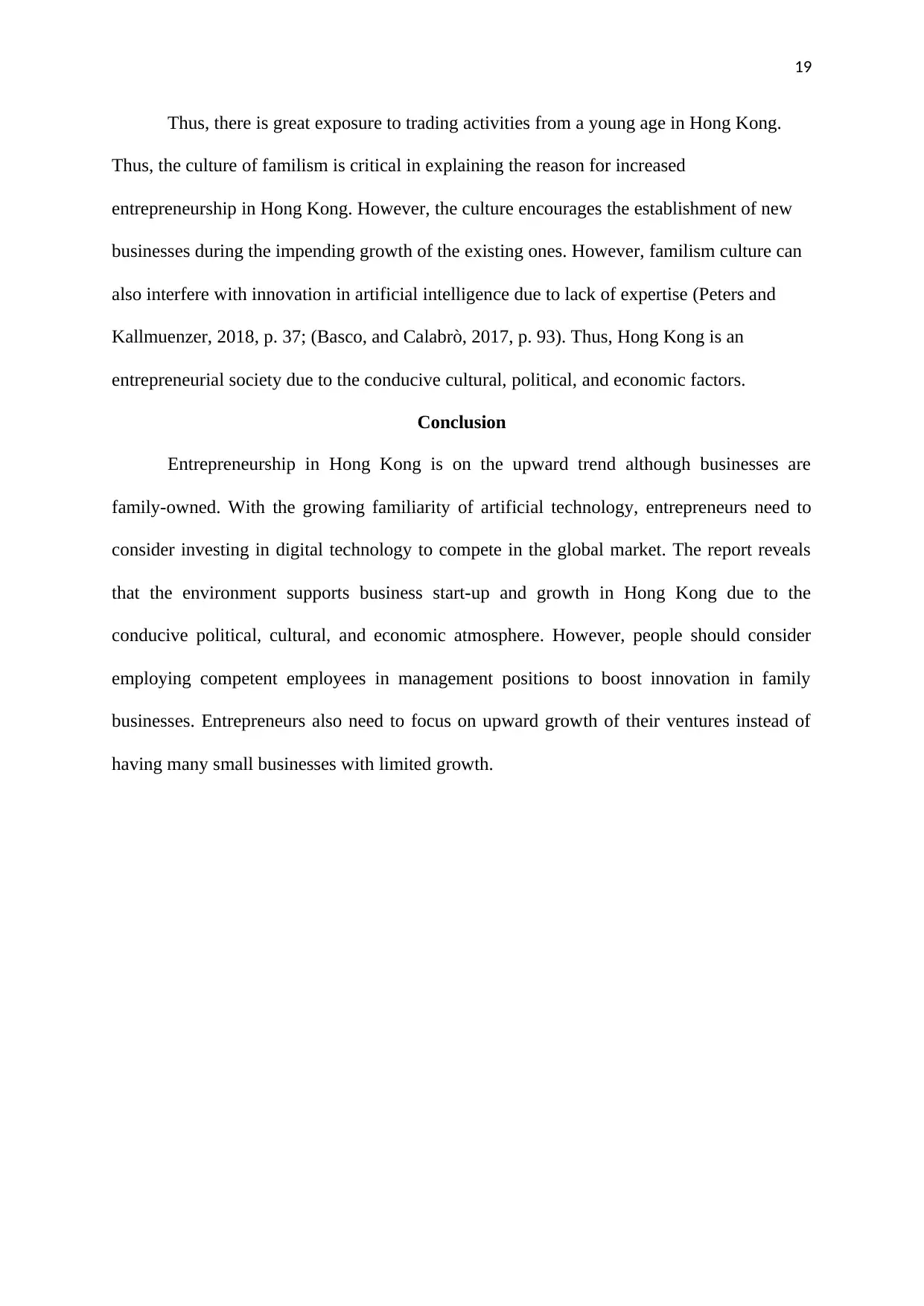
19
Thus, there is great exposure to trading activities from a young age in Hong Kong.
Thus, the culture of familism is critical in explaining the reason for increased
entrepreneurship in Hong Kong. However, the culture encourages the establishment of new
businesses during the impending growth of the existing ones. However, familism culture can
also interfere with innovation in artificial intelligence due to lack of expertise (Peters and
Kallmuenzer, 2018, p. 37; (Basco, and Calabrò, 2017, p. 93). Thus, Hong Kong is an
entrepreneurial society due to the conducive cultural, political, and economic factors.
Conclusion
Entrepreneurship in Hong Kong is on the upward trend although businesses are
family-owned. With the growing familiarity of artificial technology, entrepreneurs need to
consider investing in digital technology to compete in the global market. The report reveals
that the environment supports business start-up and growth in Hong Kong due to the
conducive political, cultural, and economic atmosphere. However, people should consider
employing competent employees in management positions to boost innovation in family
businesses. Entrepreneurs also need to focus on upward growth of their ventures instead of
having many small businesses with limited growth.
Thus, there is great exposure to trading activities from a young age in Hong Kong.
Thus, the culture of familism is critical in explaining the reason for increased
entrepreneurship in Hong Kong. However, the culture encourages the establishment of new
businesses during the impending growth of the existing ones. However, familism culture can
also interfere with innovation in artificial intelligence due to lack of expertise (Peters and
Kallmuenzer, 2018, p. 37; (Basco, and Calabrò, 2017, p. 93). Thus, Hong Kong is an
entrepreneurial society due to the conducive cultural, political, and economic factors.
Conclusion
Entrepreneurship in Hong Kong is on the upward trend although businesses are
family-owned. With the growing familiarity of artificial technology, entrepreneurs need to
consider investing in digital technology to compete in the global market. The report reveals
that the environment supports business start-up and growth in Hong Kong due to the
conducive political, cultural, and economic atmosphere. However, people should consider
employing competent employees in management positions to boost innovation in family
businesses. Entrepreneurs also need to focus on upward growth of their ventures instead of
having many small businesses with limited growth.
Paraphrase This Document
Need a fresh take? Get an instant paraphrase of this document with our AI Paraphraser
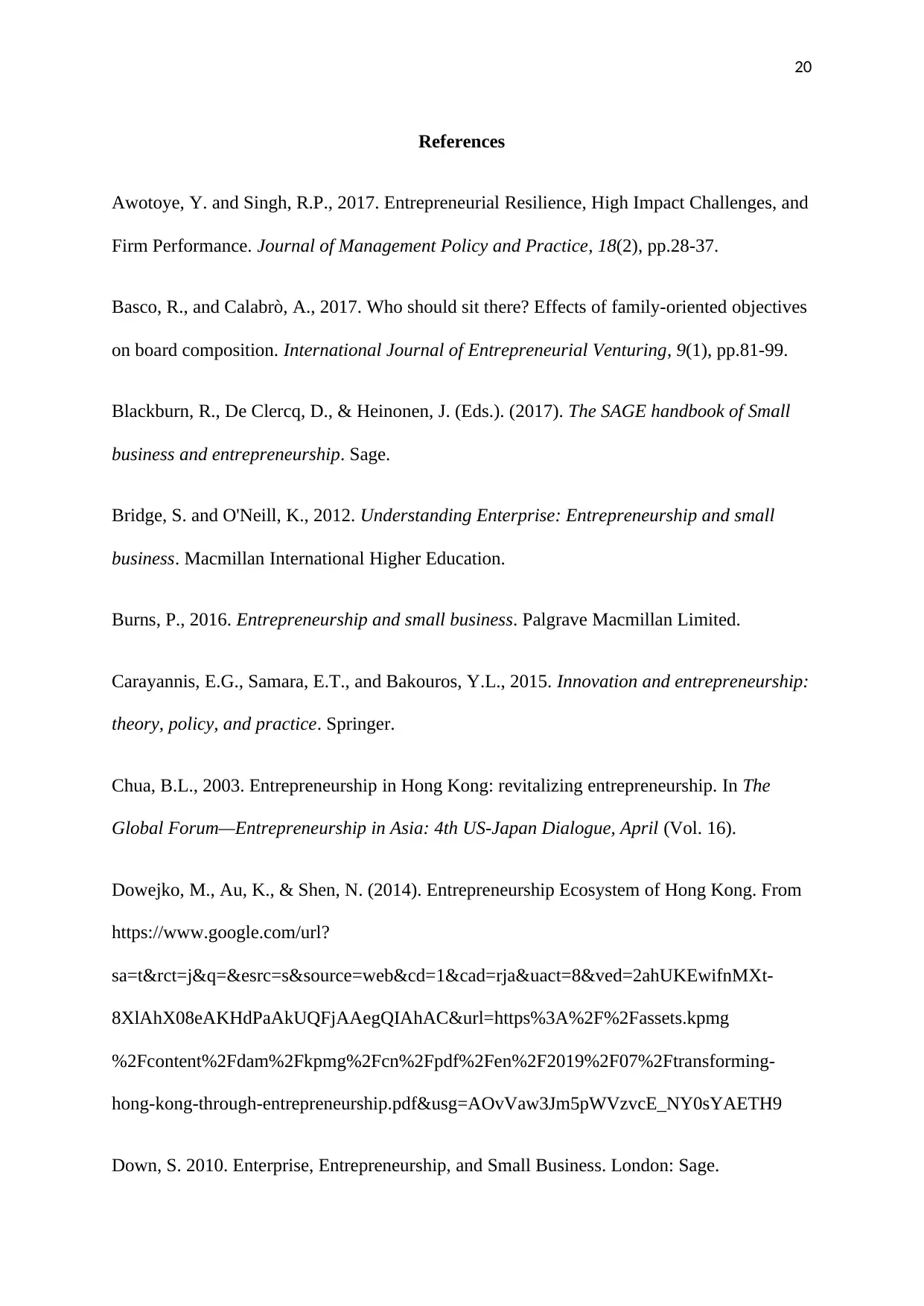
20
References
Awotoye, Y. and Singh, R.P., 2017. Entrepreneurial Resilience, High Impact Challenges, and
Firm Performance. Journal of Management Policy and Practice, 18(2), pp.28-37.
Basco, R., and Calabrò, A., 2017. Who should sit there? Effects of family-oriented objectives
on board composition. International Journal of Entrepreneurial Venturing, 9(1), pp.81-99.
Blackburn, R., De Clercq, D., & Heinonen, J. (Eds.). (2017). The SAGE handbook of Small
business and entrepreneurship. Sage.
Bridge, S. and O'Neill, K., 2012. Understanding Enterprise: Entrepreneurship and small
business. Macmillan International Higher Education.
Burns, P., 2016. Entrepreneurship and small business. Palgrave Macmillan Limited.
Carayannis, E.G., Samara, E.T., and Bakouros, Y.L., 2015. Innovation and entrepreneurship:
theory, policy, and practice. Springer.
Chua, B.L., 2003. Entrepreneurship in Hong Kong: revitalizing entrepreneurship. In The
Global Forum—Entrepreneurship in Asia: 4th US-Japan Dialogue, April (Vol. 16).
Dowejko, M., Au, K., & Shen, N. (2014). Entrepreneurship Ecosystem of Hong Kong. From
https://www.google.com/url?
sa=t&rct=j&q=&esrc=s&source=web&cd=1&cad=rja&uact=8&ved=2ahUKEwifnMXt-
8XlAhX08eAKHdPaAkUQFjAAegQIAhAC&url=https%3A%2F%2Fassets.kpmg
%2Fcontent%2Fdam%2Fkpmg%2Fcn%2Fpdf%2Fen%2F2019%2F07%2Ftransforming-
hong-kong-through-entrepreneurship.pdf&usg=AOvVaw3Jm5pWVzvcE_NY0sYAETH9
Down, S. 2010. Enterprise, Entrepreneurship, and Small Business. London: Sage.
References
Awotoye, Y. and Singh, R.P., 2017. Entrepreneurial Resilience, High Impact Challenges, and
Firm Performance. Journal of Management Policy and Practice, 18(2), pp.28-37.
Basco, R., and Calabrò, A., 2017. Who should sit there? Effects of family-oriented objectives
on board composition. International Journal of Entrepreneurial Venturing, 9(1), pp.81-99.
Blackburn, R., De Clercq, D., & Heinonen, J. (Eds.). (2017). The SAGE handbook of Small
business and entrepreneurship. Sage.
Bridge, S. and O'Neill, K., 2012. Understanding Enterprise: Entrepreneurship and small
business. Macmillan International Higher Education.
Burns, P., 2016. Entrepreneurship and small business. Palgrave Macmillan Limited.
Carayannis, E.G., Samara, E.T., and Bakouros, Y.L., 2015. Innovation and entrepreneurship:
theory, policy, and practice. Springer.
Chua, B.L., 2003. Entrepreneurship in Hong Kong: revitalizing entrepreneurship. In The
Global Forum—Entrepreneurship in Asia: 4th US-Japan Dialogue, April (Vol. 16).
Dowejko, M., Au, K., & Shen, N. (2014). Entrepreneurship Ecosystem of Hong Kong. From
https://www.google.com/url?
sa=t&rct=j&q=&esrc=s&source=web&cd=1&cad=rja&uact=8&ved=2ahUKEwifnMXt-
8XlAhX08eAKHdPaAkUQFjAAegQIAhAC&url=https%3A%2F%2Fassets.kpmg
%2Fcontent%2Fdam%2Fkpmg%2Fcn%2Fpdf%2Fen%2F2019%2F07%2Ftransforming-
hong-kong-through-entrepreneurship.pdf&usg=AOvVaw3Jm5pWVzvcE_NY0sYAETH9
Down, S. 2010. Enterprise, Entrepreneurship, and Small Business. London: Sage.
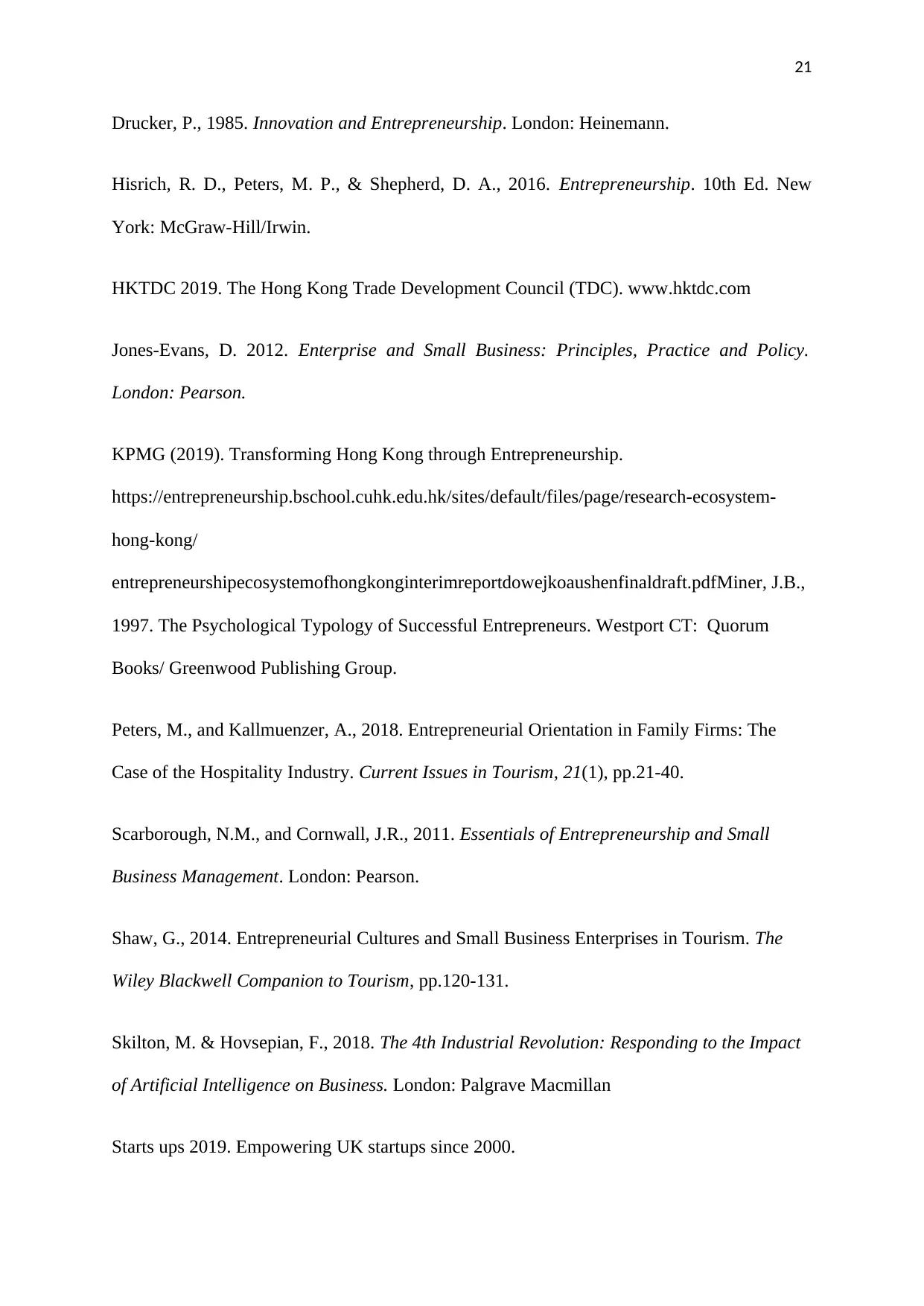
21
Drucker, P., 1985. Innovation and Entrepreneurship. London: Heinemann.
Hisrich, R. D., Peters, M. P., & Shepherd, D. A., 2016. Entrepreneurship. 10th Ed. New
York: McGraw-Hill/Irwin.
HKTDC 2019. The Hong Kong Trade Development Council (TDC). www.hktdc.com
Jones-Evans, D. 2012. Enterprise and Small Business: Principles, Practice and Policy.
London: Pearson.
KPMG (2019). Transforming Hong Kong through Entrepreneurship.
https://entrepreneurship.bschool.cuhk.edu.hk/sites/default/files/page/research-ecosystem-
hong-kong/
entrepreneurshipecosystemofhongkonginterimreportdowejkoaushenfinaldraft.pdfMiner, J.B.,
1997. The Psychological Typology of Successful Entrepreneurs. Westport CT: Quorum
Books/ Greenwood Publishing Group.
Peters, M., and Kallmuenzer, A., 2018. Entrepreneurial Orientation in Family Firms: The
Case of the Hospitality Industry. Current Issues in Tourism, 21(1), pp.21-40.
Scarborough, N.M., and Cornwall, J.R., 2011. Essentials of Entrepreneurship and Small
Business Management. London: Pearson.
Shaw, G., 2014. Entrepreneurial Cultures and Small Business Enterprises in Tourism. The
Wiley Blackwell Companion to Tourism, pp.120-131.
Skilton, M. & Hovsepian, F., 2018. The 4th Industrial Revolution: Responding to the Impact
of Artificial Intelligence on Business. London: Palgrave Macmillan
Starts ups 2019. Empowering UK startups since 2000.
Drucker, P., 1985. Innovation and Entrepreneurship. London: Heinemann.
Hisrich, R. D., Peters, M. P., & Shepherd, D. A., 2016. Entrepreneurship. 10th Ed. New
York: McGraw-Hill/Irwin.
HKTDC 2019. The Hong Kong Trade Development Council (TDC). www.hktdc.com
Jones-Evans, D. 2012. Enterprise and Small Business: Principles, Practice and Policy.
London: Pearson.
KPMG (2019). Transforming Hong Kong through Entrepreneurship.
https://entrepreneurship.bschool.cuhk.edu.hk/sites/default/files/page/research-ecosystem-
hong-kong/
entrepreneurshipecosystemofhongkonginterimreportdowejkoaushenfinaldraft.pdfMiner, J.B.,
1997. The Psychological Typology of Successful Entrepreneurs. Westport CT: Quorum
Books/ Greenwood Publishing Group.
Peters, M., and Kallmuenzer, A., 2018. Entrepreneurial Orientation in Family Firms: The
Case of the Hospitality Industry. Current Issues in Tourism, 21(1), pp.21-40.
Scarborough, N.M., and Cornwall, J.R., 2011. Essentials of Entrepreneurship and Small
Business Management. London: Pearson.
Shaw, G., 2014. Entrepreneurial Cultures and Small Business Enterprises in Tourism. The
Wiley Blackwell Companion to Tourism, pp.120-131.
Skilton, M. & Hovsepian, F., 2018. The 4th Industrial Revolution: Responding to the Impact
of Artificial Intelligence on Business. London: Palgrave Macmillan
Starts ups 2019. Empowering UK startups since 2000.
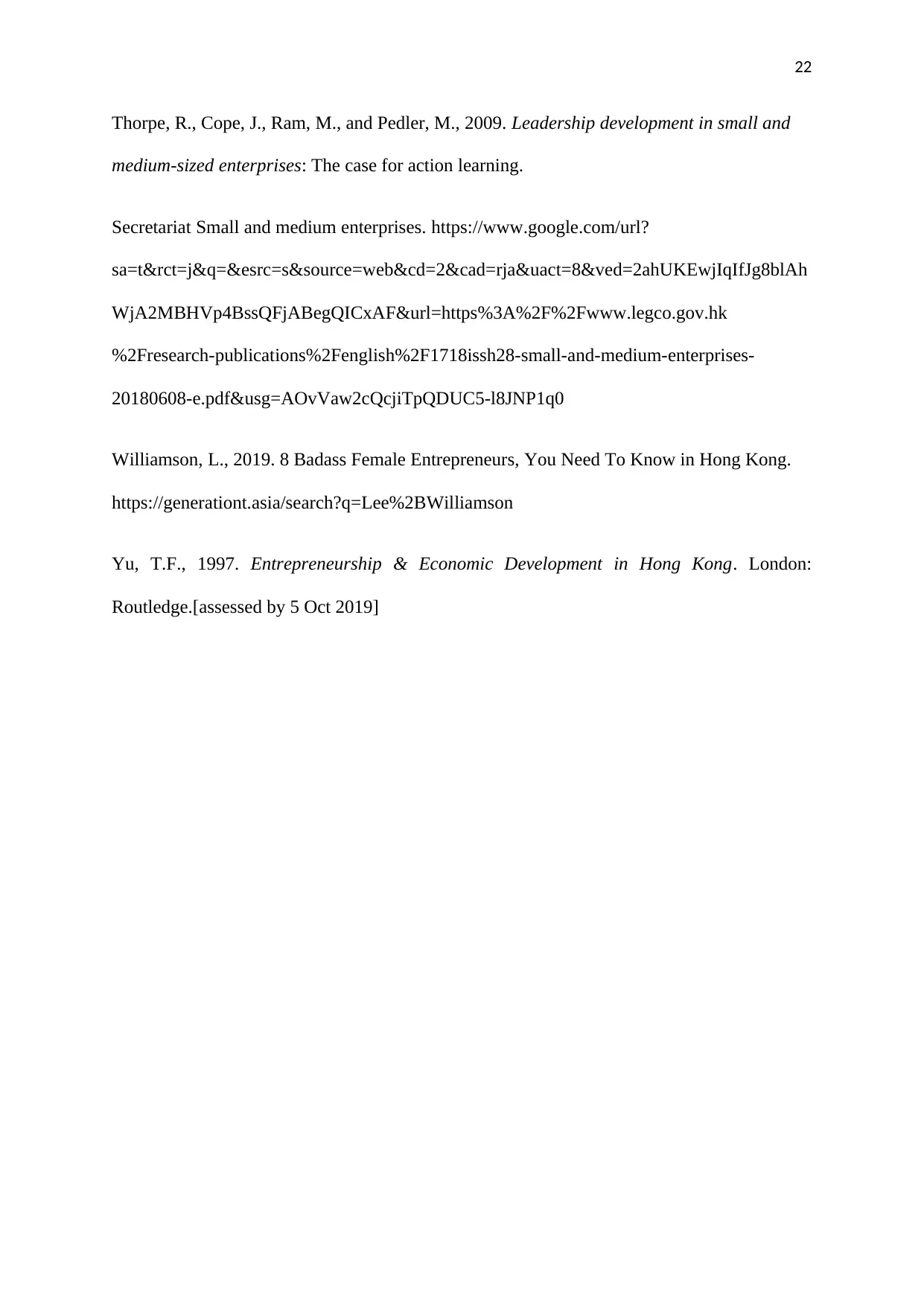
22
Thorpe, R., Cope, J., Ram, M., and Pedler, M., 2009. Leadership development in small and
medium-sized enterprises: The case for action learning.
Secretariat Small and medium enterprises. https://www.google.com/url?
sa=t&rct=j&q=&esrc=s&source=web&cd=2&cad=rja&uact=8&ved=2ahUKEwjIqIfJg8blAh
WjA2MBHVp4BssQFjABegQICxAF&url=https%3A%2F%2Fwww.legco.gov.hk
%2Fresearch-publications%2Fenglish%2F1718issh28-small-and-medium-enterprises-
20180608-e.pdf&usg=AOvVaw2cQcjiTpQDUC5-l8JNP1q0
Williamson, L., 2019. 8 Badass Female Entrepreneurs, You Need To Know in Hong Kong.
https://generationt.asia/search?q=Lee%2BWilliamson
Yu, T.F., 1997. Entrepreneurship & Economic Development in Hong Kong. London:
Routledge.[assessed by 5 Oct 2019]
Thorpe, R., Cope, J., Ram, M., and Pedler, M., 2009. Leadership development in small and
medium-sized enterprises: The case for action learning.
Secretariat Small and medium enterprises. https://www.google.com/url?
sa=t&rct=j&q=&esrc=s&source=web&cd=2&cad=rja&uact=8&ved=2ahUKEwjIqIfJg8blAh
WjA2MBHVp4BssQFjABegQICxAF&url=https%3A%2F%2Fwww.legco.gov.hk
%2Fresearch-publications%2Fenglish%2F1718issh28-small-and-medium-enterprises-
20180608-e.pdf&usg=AOvVaw2cQcjiTpQDUC5-l8JNP1q0
Williamson, L., 2019. 8 Badass Female Entrepreneurs, You Need To Know in Hong Kong.
https://generationt.asia/search?q=Lee%2BWilliamson
Yu, T.F., 1997. Entrepreneurship & Economic Development in Hong Kong. London:
Routledge.[assessed by 5 Oct 2019]
1 out of 22
Related Documents
Your All-in-One AI-Powered Toolkit for Academic Success.
+13062052269
info@desklib.com
Available 24*7 on WhatsApp / Email
![[object Object]](/_next/static/media/star-bottom.7253800d.svg)
Unlock your academic potential
© 2024 | Zucol Services PVT LTD | All rights reserved.





